Celebration of women filmmakers triggers heated debate among Salma Hayek, Jessica Williams and Shirley MacLaine
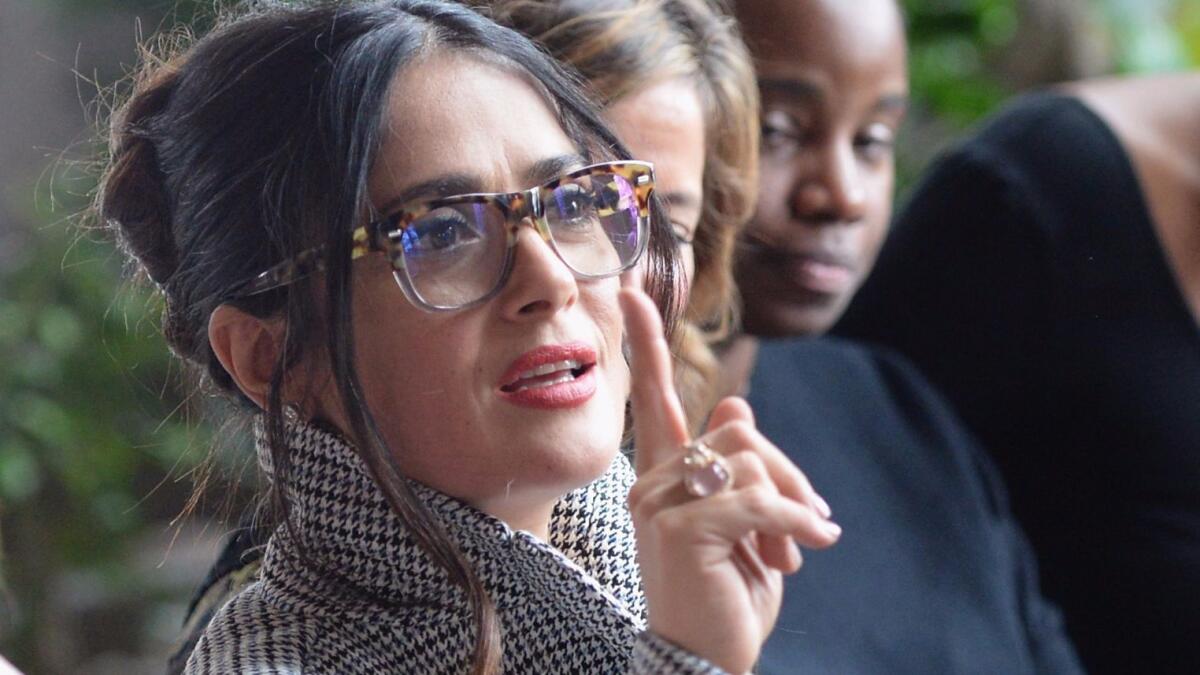
“Is your coat wool?” Alfre Woodard asked as she sat at a long, flower-filled table draped with purple paisley Italian linen. “I’m allergic to wool. I can never wear anything nice.”
Under the cavernous, vaulted ceiling of a mountain mansion, where the driveway was heated, an indoor stream trickled and a string of faux llamas stood guard on the stone staircase, Woodard sipped a spoonful of vegan cream of vegetable soup served by celebrity chef Cat Cora. Nearby, Marti Noxon, one of the creators of the Lifetime series “Unreal,” talked about her feature film debut, “To the Bone,” which would sell the next day to Netflix for a reported $8 million.
Here at the home of ChefDance CEO and founder Mimi Kim, Woodard, Shirley MacLaine, Elle Fanning and Jill Soloway were just part of a formidable group gathered during the Sundance Festival for a lunch to celebrate women in film.
Cindi Leive, editor in chief of Glamour, explained how the magazine had partnered with photographer and talk-show host Amanda de Cadenet’s Girlgaze, a digital initiative for women behind the camera. They wanted to explore how they could support women filmmakers through their respective platforms.
But while these types of occasions present plenty of moments for business-card trading and jealousy-inducing Instagram photos, the open discussions usually stick to polite words of encouragement and empowerment stories.
In that spirit, the idea of mentorships for up-and-coming women in the industry was floated by De Cadenet. Director Kimberly Peirce spoke about how it was important not to stray from female pleasure on-screen and told a story about how the MPAA took issue with a female orgasm that lasted too long in her film “Boys Don’t Cry.”
Then the conversation shifted to our new president.
“My feeling,” said Salma Hayek, “is that we are about to go to war.”
Racial divisions, political upheaval and a gay love story take the Sundance spotlight
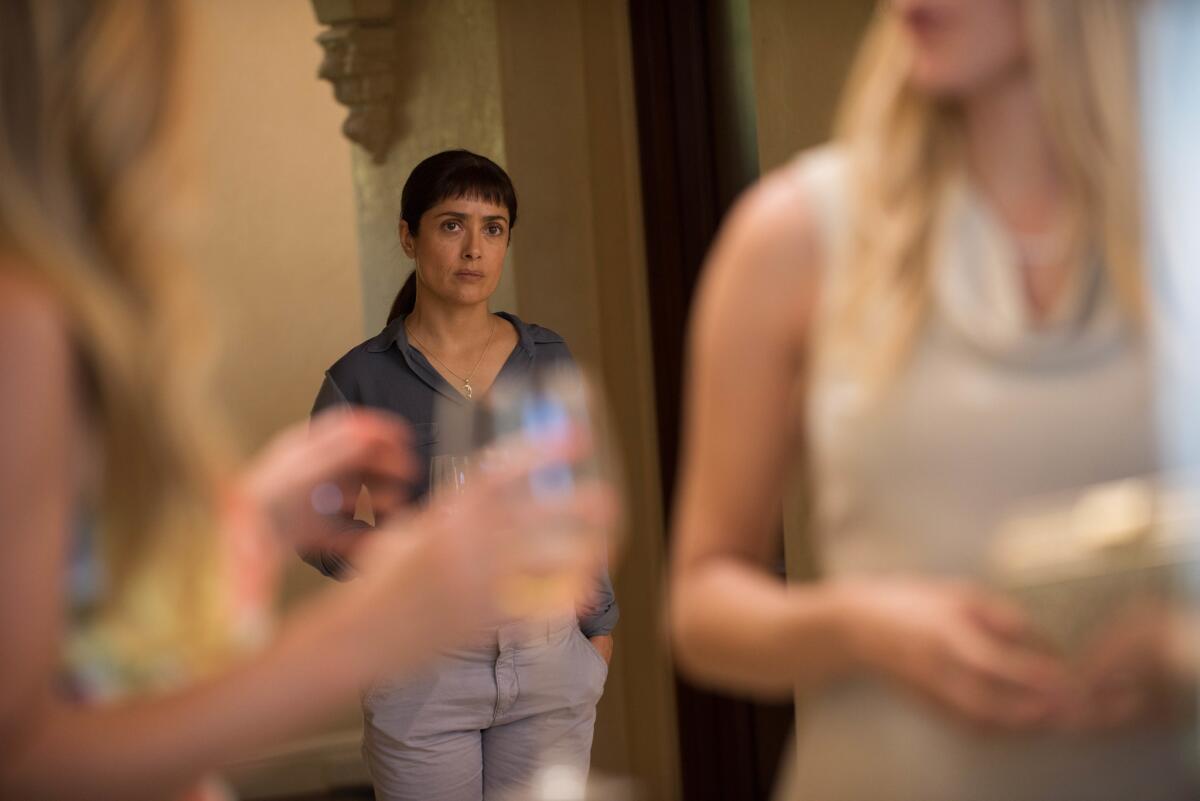
By the time the Sundance Film Festival came to a close Saturday night, it was clear that there had been no 2017 equivalent of “The Birth of a Nation” at the festival this year — no cinematic sensation that swooped in from nowhere to dominate the prizes, score the biggest acquisition deal and promise the industry a badly needed diversity makeover. (Happily, this year’s Academy Award nominations have spared us a three-quel to #OscarsSoWhite.)
If anything, a certain amount of caution could be detected on the part of distributors, journalists and even filmmakers, as though everyone in attendance were trying to avoid the trap of self-importance in a year when real-world matters — from President Trump’s inauguration and the women’s march to reports of a cyber attack on the festival — provided more than their fair share of off-screen drama.
Which is not to suggest that the films unveiled over 10 days in Park City, Utah, were somehow disappointing, or not up to the challenge of speaking to our politically fraught moment. Far from it. There were, as usual, movies about fractious racial divisions, including “Mudbound,” Dee Rees’ symphonic, superbly acted drama about two Mississippi families — one white, one black — struggling to survive in the shadow of World War II.
Less widely seen, although it won the audience award in the festival’s Next sidebar (devoted to innovative, low-budget work), was Justin Chon’s “Gook,” a raucous, bittersweet comedy set during the Los Angeles riots in April 1992. Shot in black-and-white, the movie both explores and sneakily subverts the fractious relations between Korean and African Americans during that tumultuous chapter.
That sold for HOW much? The big deals out of Sundance
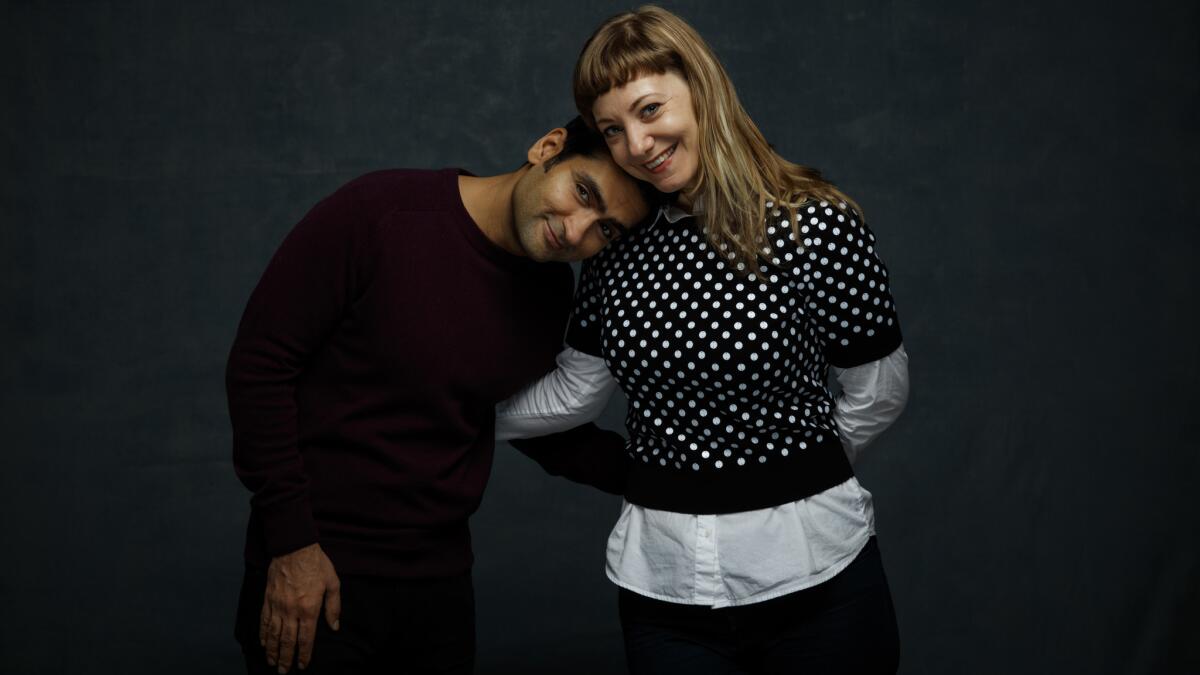
Last year’s Sundance Film Festival saw two of the priciest deals in the history of this gathering: Fox Searchlight’s record-breaking $17.5 million for “The Birth of a Nation” and Amazon/Roadside’s not quite as Brinks-busting $10 million for “Manchester by the Sea.”
Those films wound up with two, well, very different commercial fates. As much as dollars can be an indicator of a film’s value, they’re hardly an ironclad guarantee of success. Too many other factors can enter the picture between the January frenzy in the mountains and the fall derby into which many of these films will enter.
Judging by the totals in Park City this year, buyers are feeling optimistic. Very optimistic. Whether it’s traditional players like Searchlight and Sony Pictures Classics, newer movers-and-shakers such as Amazon and Netflix or even upstarts like Neon and FilmRise, wallets have been opening up over the last week at Sundance. As of Friday, a whopping eight movies have gone for at least $5 million as the quantity of buyers (and, depending on whom you ask, the quality of movies) has sent dollar amounts skyward.
Which movies went for the biggest totals? And which have the best chance of repeating “Manchester’s” box office and awards feats? We break down those eight big deals and handicap how they’ll pan out — or at least what studios will need to do to give them the best shot of succeeding.
Films about, and by, women take top honors at politics-heavy Sundance awards
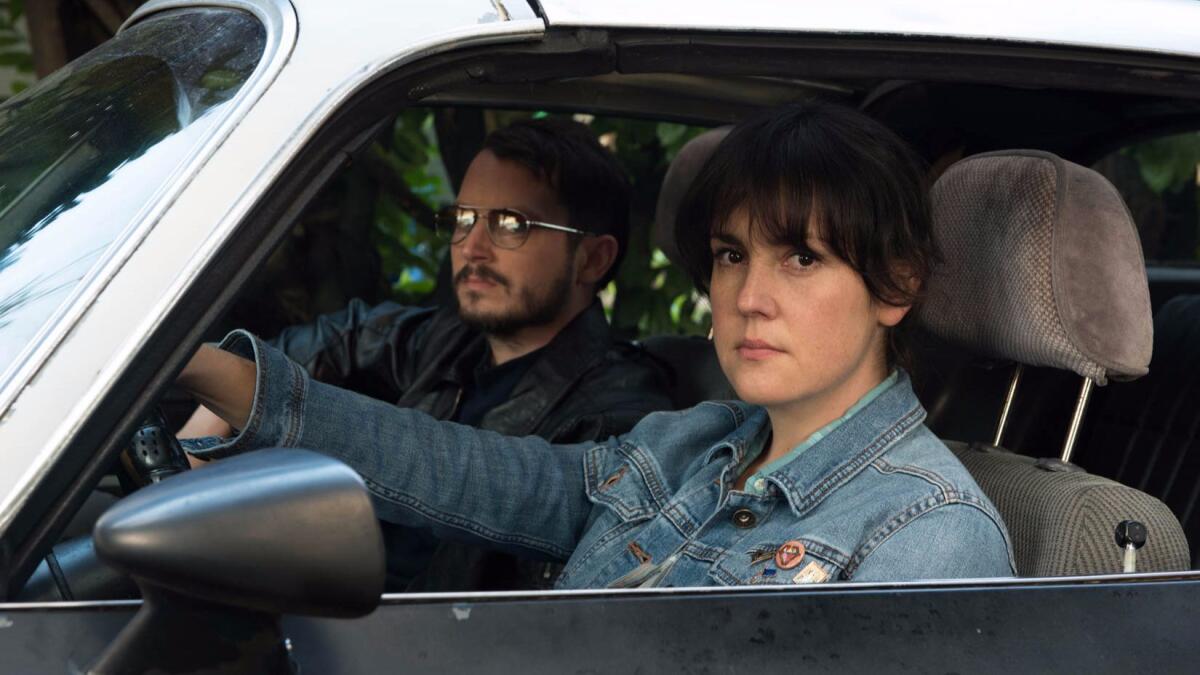
A Sundance Film Festival that was colored, gripped and sometimes overshadowed by the early days of the Donald Trump administration saw a slew of feminist films win big at the gathering’s awards. Multiple female filmmakers nabbed top prizes, while a tale of a woman reasserting control over her life scored the festival’s highest honor.
Macon Blair’s “I Don’t Feel at Home in This World Anymore,” in which Melanie Lynskey plays an ordinary woman who becomes empowered as a detective-avenger after she is robbed, won the U.S. grand jury prize in the dramatic category. To its fans, the genre-tinged film, which Netflix will release next month, serves as a tonic to the perceived anti-female policies of the Trump administration.
And Eliza Hittman’s gay coming-of-age story “Beach Rats” won the directing award for the U.S. dramatic section -- ensuring that a gathering that began with a march down this city’s Main Street championing feminist values closed out with the same motif.
“There’s nothing more taboo in this country than a woman with ambition,” Hittman said in her acceptance speech. “I’m going to work my way through a system that’s completely discriminatory toward women. Hollywood, I’m coming for you,” she finished to loud cheers.
Life lessons on family from ‘Wilson’

Director Craig Johnson and actor Judy Greer discuss family in the film “Wilson.”
‘Thoroughbred’ director Cory Finley on the art of character development

Cory Finley describes how he developed the characters for his film “Thoroughbred.”
Favorite moments from ‘Roxanne Roxanne’

Actors Chanté Adams and Nia Long talk about their favorites moments during the filming of “Roxanne Roxanne,” a hip-hop biopic about Roxanne Shanté, the iconic New York City MC.
The first meeting for ‘Roxanne Roxanne’
‘Mudbound’ director Dee Rees shoots for the stars and gets her dream cast

Director Dee Rees talks about casting Mary J. Blige, Carey Mulligan and Jason Mitchell for her film “Mudbound.” After loving Mitchell’s performance in “Straight Outta Compton,” Rees said, “I’d be so lucky to get him in my film.”
Why Sam Elliott’s smoking scene in ‘The Hero’ was so ‘brutal’

Star Sam Elliott and director Brett Haley describe the difficulties of shooting the marijuana smoking scene in “The Hero.”
Marianna Palka and Jason Ritter, on why ‘Bitch’ is the perfect title for their film
Jim Strouse says ‘The Incredible Jessica James’ was made for Jessica Williams

Director Jim Strouse talks about writing the title character in “The Incredible Jessica James” for Jessica Williams.
Post-racial horror ‘Get Out,’ the scariest film at Sundance, skewers liberal America
The scariest film to come out of Sundance arrived the Monday after Donald Trump took office, when comedian Jordan Peele (“Key and Peele,” Keanu”) unveiled a secret screening of his upcoming horror film “Get Out.”
Peele, known for satirizing America’s social landscape as one half of the sketch-comedy duo Key & Peele, makes his directorial debut with the tale of an African American man (“Black Mirror”’s Daniel Kaluuya) heading upstate to meet his white girlfriend’s parents for the first time.
It’s not their interracial romance that’s the problem, but how the seemingly open-minded people in her hometown react: The rich old white folks eager to compliment Chris’s physicality, ponder his sexual prowess, make sure to tell him how much they admire Tiger Woods.
Chris is relieved, then, to meet other black people around town – but can’t put his finger on why they act so oddly happy to live in subservience, disquieting grins stretched across their faces.
It’s “The Stepford Wives” for a micro-aggressive 2017 America in which racism still lurks beneath a progressive smile, ignorant to its own existence.
The film, which Universal releases nationwide on Feb. 24, premiered at Sundance on the heels of Trump’s first few days in the White House as the anxieties of the nation’s minorities were exacerbated by fears of what’s to come. It couldn’t feel more timely.
“It was important to me for this movie not to be about this black guy going to the South, to a red state, where the presumption for a lot of people is that everybody’s racist there,” Peele told the audience. “This was really meant to take a stab at the liberal elite that tends to believe that they’re – we’re – above these things.”
The cast (including Lakeith Stanfield, Catherine Keener, Bradley Whitford and Lil Rel Howery) is sharp, and so is the unblinking racial satire seeded in darkly humorous moments that ring acutely, awkwardly true – like when Chris tempers his initial trepidation as Rose (Allison Williams) insists that her affluent liberal parents are far from racist because, after all, her dad “would vote for Obama for a third term if he could!”
Among the sold-out midnight crowd was an enthusiastic Patton Oswalt, who stood up during the post-screening Q&A to tell Peele that the film, produced by “The Purge” and “Split” horror maven Jason Blum, was brilliant.
Also reportedly spotted in the late-night audience: Former first daughter Malia Obama, who made the most of her trip to Sundance (and readied for her upcoming internship with film mogul Harvey Weinstein) not by partying her way through Park City but by actually watching films.
Her reported presence at “Get Out” made those President Obama references ring louder, but also underscored the prescient timing of its release.
Premiering at Sundance two days after the world witnessed a historic show of solidarity by women and minorities united against Trump’s proposed policies, “Get Out” is a mildly gory, crowd-pleasing ride with a pointed provocation for its mass audience: If you think racism no longer exists, look more closely.
Peele got the idea over eight years ago while watching division erupt in liberal circles as Hillary Clinton and Obama faced off in the primaries for the Democratic nomination.
“All of a sudden the country was focused for a second on the black civil rights and women’s civil rights movements and where they intersect, and there was this question of, ‘Who deserves to be president more? Who’s waited long enough?’ Of course, it’s an absurd thing that civil rights are even divided. It should be one civil right,” Peele said.
“For while when we had a black president, we were living in this post-racial lie,” he added. “The idea of, ‘We’re past it – we’re past it all!’ For me, and for many people out there – as all black people know – there’s racism. I experience it on an everyday basis. This movie was meant to reveal that there’s this monster of racism lurking underneath some of these seemingly innocent conversations and situations.”
Watch a nightclub shooting in virtual reality? For Rose Troche, painful subjects make for powerful art
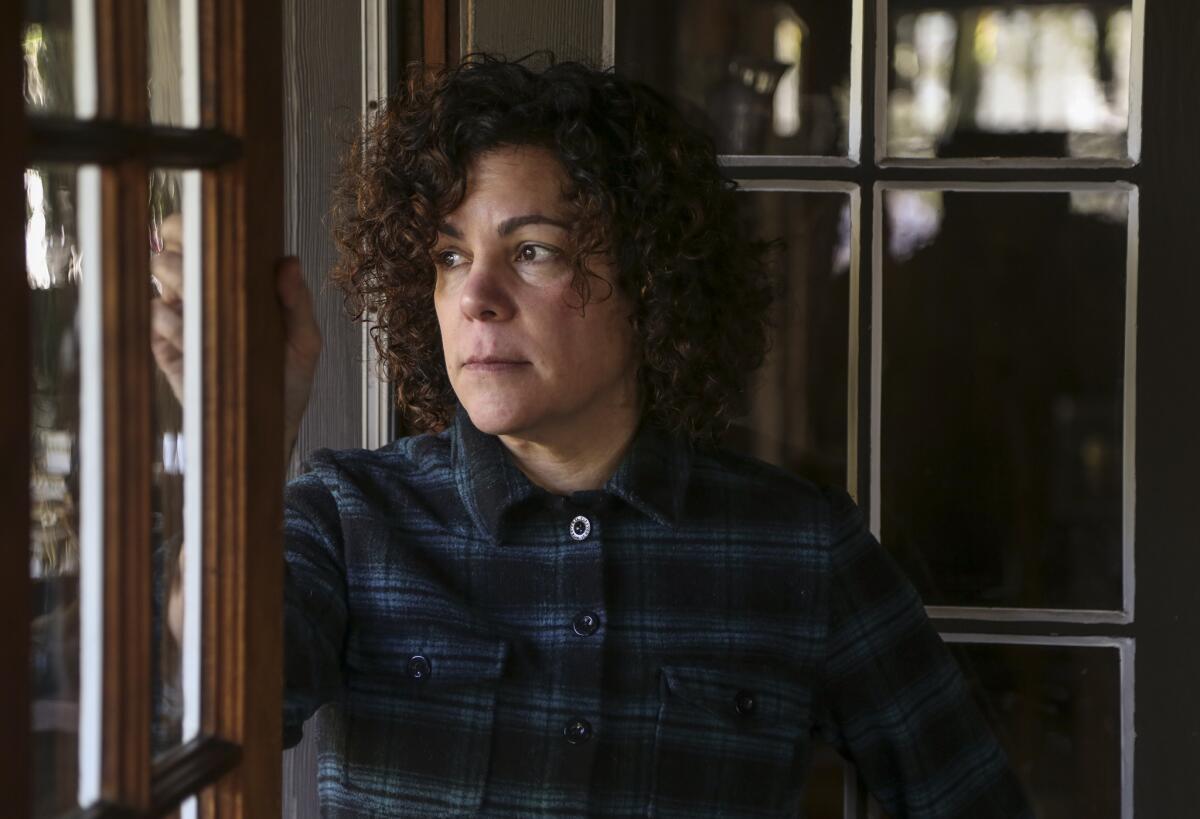
Rose Troche says she came out three times in her life: first as a Puerto Rican, next as an artist and finally as a gay person.
“By the time I came out as gay, it was like, ‘Oh, this old thing?’” jokes Troche, the child of immigrant parents who grew up hiding her minority identity on multiple levels in a tough Chicago neighborhood during the 1960s and ’70s.
Relaxing on a couch in a Hollywood Hills chalet, she explains how she’s in the midst of a fourth coming-out of sorts. As a writer and director on the vanguard of virtual reality, she’s trying to articulate that her latest form of art isn’t filmmaking.
It’s a tricky but important sticking point for the celebrated indie filmmaker, whose virtual reality project “If Not Love” premiered this week at the Sundance Film Festival’s experimental New Frontier arts and media exhibition.
Since 2012, New Frontier has showcased the film world’s bold and exciting steps into the VR space. Troche, who has exhibited three pieces at New Frontier since 2014, is searching for fresh language to describe that entrance.
“I’m advocating for a whole new set of words so that we stop calling it ‘cinema,’” she says. “This needs to exist as what it is and not be put into a funnel of what is a beautiful and amazing medium, but it’s not the same thing.”
Troche would know. She carved out a career for herself in film after her 1994 feature debut, the lesbian romantic comedy “Go Fish,” became a cult hit. Made for $15,000, the film grossed more than $2.4 million at the box office thanks to a string of awards and a nomination for a Grand Jury Prize at Sundance.
I do pieces that take you to places that you don’t want to go, and I don’t want to take you to those places on a whim or in a cavalier way.
— Rose Troche
Film gave way to a decade spent building commercial success in television, most notably as the co-executive producer of the lesbian drama “The L Word.” But a history of social activism and a desire for a new artistic challenge drove Troche to create VR work.
Three out of four of her pieces have dealt with difficult subjects. “Perspective Chapter 1: The Party” was a first-person exploration of date rape from the point of view of both the survivor and the assailant. “Perspective Chapter 2: The Misdemeanor” told the story of a police shooting from the perspective of a policeman and a young black man being shot.
The new work, “If Not Love,” is a short piece that takes the viewer on a painful, 360-degree journey through a mass shooting at a gay nightclub. “If Not Love” isn’t intended to re-create last year’s Pulse nightclub massacre in Orlando, Fla., but the project was inspired by that incident as well as by the tragedy in Nice, France, when a truck plowed through a crowd at a Bastille Day celebration.
In both cases, Troche wondered if anything could have been done to stop the violence.
“If Not Love” explores that thought by following the story of a closeted gay man who, after an anonymous hookup, decides to carry out a shooting at a nightclub. The piece presents an alternate scenario where, instead of letting him leave after sex, the man’s partner asks him to stay. The two men kiss and hold each other, while back at the nightclub the bodies on the ground suddenly rise up in reverse of the falls they took in the shooting.
The idea, which Troche admits is perhaps naively simplistic, is that a single act of love just might save someone from himself. She felt VR would be the most effective medium to get her idea across because of its immediacy.
“This form allows you a shortness of story, but in a more immersive way,” Troche says. “I do pieces that take you to places that you don’t want to go, and I don’t want to take you to those places on a whim or in a cavalier way. I wouldn’t want you to be immersed in this for more than seven minutes.”
If this isn’t film, what is it? You watch it like film, only through a special headset. And the watching is active, instead of inactive. VR encourages you to move around — to look up, down, right and left. If you turn completely around during the scene in “If Not Love,” when the shooter is leaving after his secret tryst, for example, you will see a child’s car seat.
With VR, Troche says, “we are relearning how to watch. It’s teaching us how to view things differently, and to be more intuitive viewers.”
New Frontier curator Shari Frilot says she has invited Troche to exhibit year after year because of her “ability to emotionally penetrate the limits of the intellect … in ways that are powerful, familiar and accessible.”
“She continues to stand out as a storyteller in this field who is doing something unique around combining classic aspects of filmmaking — character, performance, story structure — with the embodied power of this immersive medium in ways that continue to push this field forward,” says Frilot, who has seen New Frontier grow exponentially since its inception in 2007 as a fledgling space at the intersection of art, filmmaking and technology.
Troche believes that VR will claim its rightful place in the pantheon of future media arts when its makers learn to create strong narratives with powerhouse performances. Three years ago, she says, it was popular to say narrative couldn’t be done in VR. This has been proven false, but to date she doesn’t feel the accomplishment has been properly achieved.
“It’s really important to me to test the parameters of how to create sustainable narratives in VR,” Troche says, adding that the sooner a cohesive language to describe it emerges, including critics who understand and employ that language, the sooner that feat will be accomplished.
Actors, too, will need to relearn their craft if VR is to flourish. Actors are never off camera in a 360-degree film, unless they physically leave the room. It’s almost like being in a play, only, unlike with theater, actors in VR need to understate everything. The more they project in VR, the more false they look.
Troche’s next step into the narrative realm is a 30-minute VR comedy series called “LGBTQIA,” which she describes as “The Bad News Bears” of gay comedy.
“I’m trying to find the strengths of VR and what it has to offer,” she says.
“I watched the film ‘Blue’ alone in a movie theater, and I remember being in the space and bubble and world of it. I think VR has the potential to put viewers back in that space in a whole new way.”
Mike White and Miguel Arteta serve up Trump-era allegory in ‘Beatriz at Dinner’
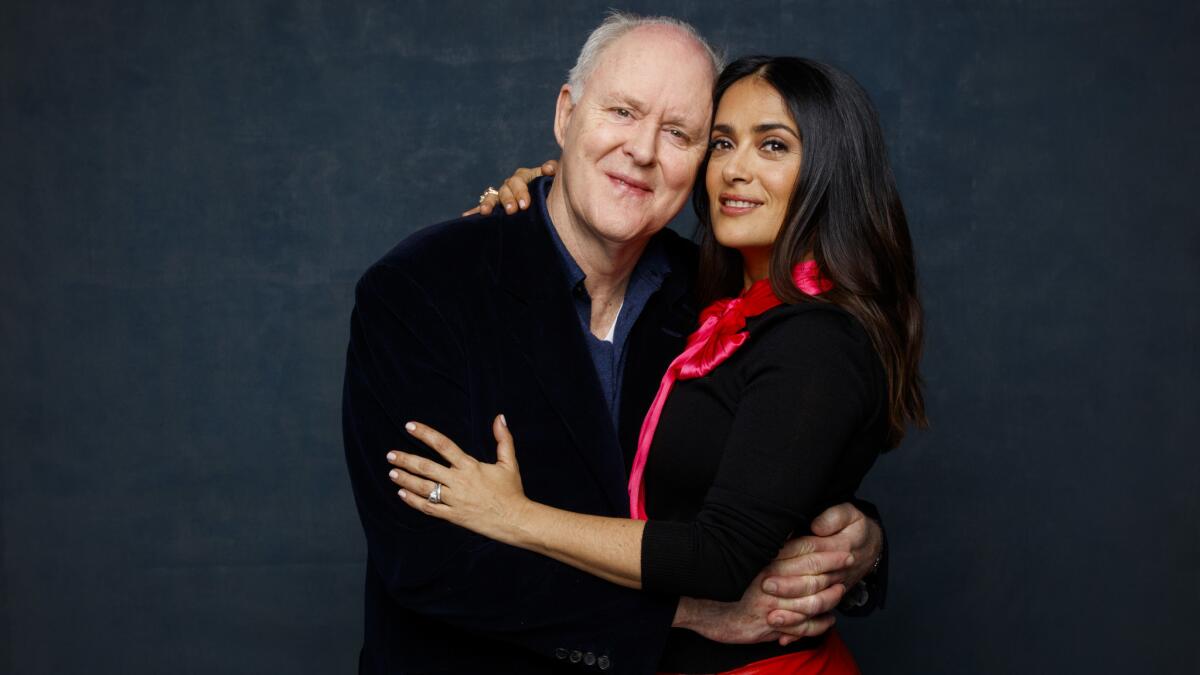
It’s a common feeling, being the odd one out. Writer Mike White seems to have made a career of it, assaying oddballs and misfits and the indignation, righteous and otherwise, that can follow with them. His ongoing on-and-off collaboration with director Miguel Arteta includes the films “Chuck & Buck” and “The Good Girl,” both of which premiered at Sundance, the television show “Enlightened” and now the new movie “Beatriz at Dinner.”
In “Beatriz at Dinner,” which is playing as part of the Premieres section at the festival, White and Arteta again update their exploration of feeling out of place. Salma Hayek plays a masseuse and spiritual healer in Los Angeles who, after her car breaks down, is invited to stay at her client’s mansion for a dinner party. When one of the guests turns out to be a mega-wealthy, celebrity real estate developer (sound familiar?), two very different worldviews come into contact and conflict.
Hayek’s Beatriz is quiet and watchful while John Lithgow’s performance as the developer is powerful and brash, as both bring an undercurrent of earnestness that avoids tipping into caricature. Connie Britton, David Warshofsky, Chloë Sevigny, Amy Landecker, John Early and Jay Duplass fill out the cast.
The film is by turns wounded and confused, virtuous and angry. Even though it was begun well before the election of Donald Trump to the presidency, the film still has a reeling, decentered emotional core that makes it feel extremely current.
Can an amateur craftsman, on the floor of his unheated home, replicate a priceless violin?
He started playing at age 2½ and had his debut with the Philadelphia Orchestra when he was 10. So when film director Stefan Avalos says “I’ve never not known the violin,” he is not being hyperbolic.
But even Avalos had never met anyone like Danny Houck, the violin-obsessed subject of his irresistible, way-stranger-than-fiction documentary “Strad Style,” which screened this week at Sundance’s crosstown rival, Slamdance.
An eccentric loner living on next to no money in a rundown farmhouse in Laurelville, Ohio, Houck lives and breathes the violin. “His knowledge is encyclopedic, he will tell you things you never knew,” says Avalos. “He is absolutely obsessed and immersed in the thing.”
More than that, Houck somehow contrives to build violins as well. And when he agreed to make an exact copy of Guarneri’s Il Cannone (the great Paganini’s instrument and one of the most famous violins ever made) for a rising European star, a personal and professional journey that almost defies belief began.
Avalos, who eventually transferred allegiance from music to movies, was contemplating something else entirely when Houck crossed his path. “I had been working for two years on a wide-ranging documentary about the obsession people had with the great violins, about the makers, the players, the collectors and the thieves,” he says.
“I heard through the grapevine, from a player at the Columbus Symphony,” Avalos continues, “about a guy who lived in the middle of nowhere and was really obsessed with making violins. I thought he would make an amusing five-minute bit in my film.”
Luca Guadagnino’s ‘Call Me by Your Name’ heats up a frigid festival
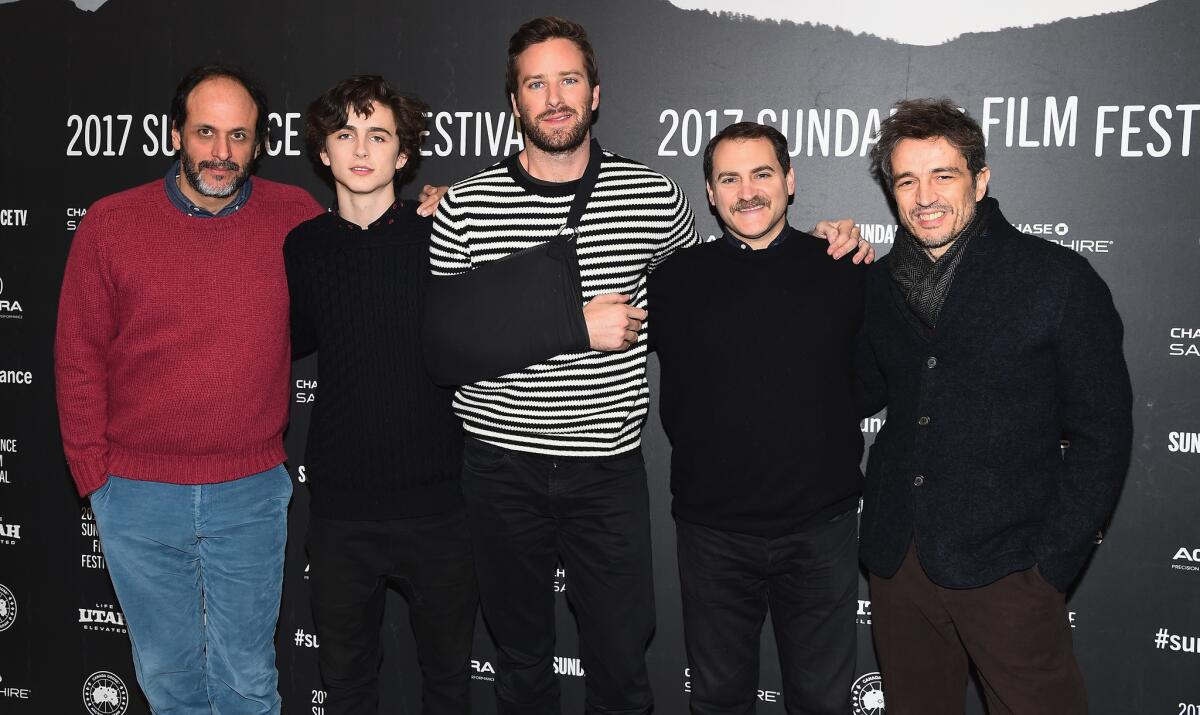
It’s become something of a film festival truism that certain movies play better at high altitudes. Exhibit A would probably be “The Blair Witch Project,” which took Sundance by storm in 1999 and generated tremendous word-of-mouth buzz, but was widely considered a disappointment by those who flocked to see it in theaters. As the conventional wisdom goes, the movie’s lost-in-the-woods premise played like gangbusters in chilly, secluded Park City, Utah, in a way that it simply couldn’t replicate closer to sea level.
Which is not to suggest that films featuring frigid forest settings have some sort of Sundance advantage. The reverse, in fact, can also be true. For viewers experiencing the frost fatigue that always sets in mid-festival, a movie set over the course of, say, a long, hot summer in Italy — where young people lie about in the sun, imbibing fresh-squeezed fruit juice and the sight of each other’s beautiful bodies — might be just the thing to take the edge off that Park City chill.
And so it was excellent meteorological counterprogramming that the festival chose one of its coldest, snowiest days so far to unveil Luca Guadagnino’s intoxicatingly al fresco new movie, “Call Me by Your Name.” Adapted from André Aciman’s novel about a teenager’s summer of love in the 1980s, the film has all the wild beauty and simmering erotic languor we’ve come to expect from the director of “I Am Love” and “A Bigger Splash,” both of which followed characters looking for love in all the wrong (but fabulously beautiful and luxurious) places.
‘Crown Heights’ tells the true story of long fight to free a man jailed for a crime he didn’t commit
To this day, Carl King can’t quite explain why he did it. Why he sacrificed 20 years of his life. His marriage. His financial security. All in a long shot bid to get his friend Colin Warner out of prison.
“Maybe it was that I grew up in a family, in Trinidad, where my older siblings were always involved in student activities,” King said. “Or maybe it just felt like a purpose. It’s your brother, and you’re not going to give up until you can help him.”
In 1980, Warner was 18, living in the Caribbean section of the Brooklyn, N.Y., neighborhood of Crown Heights. One day, the cops showed up and arrested him. He was charged with killing Mario Hamilton, a young Jamaican man in nearby Flatbush. Warner had never met Hamilton. He had never even heard of him.
In most situations, Warner would have been released quickly and the charges dropped. There was no physical evidence to implicate him and no credible witnesses either.
But the events, as told in Matt Ruskin’s new distribution-seeking Sundance movie “Crown Heights,” unfolded more tragically. With Lakeith Stanfield as Warner and Nnamdi Asomugha as King, the film offers a new twist on the buddy movie — one far more serious than slapstick. “Crown Heights” is a pointed reminder of the gaping flaws in the criminal justice system and the power of perseverance and loyalty to overcome them.
Behind the Scenes at the L.A. Times photo and video studio

A behind-the-scenes look at the L.A. Times photo and video studio at the Sundance Film Festival.
A behind the scenes look at the L.A. Times photo and video studio at the Sundance Film Festival. (Video by Myung Chun / Los Angeles Times)
L.A. Times critics weigh in on the 2017 Oscars nominations

From Amy Adams’ leading actress snub to Mel Gibson’s resurgence, L.A. Times film critics Kenneth Turan and Justin Chang discuss the Oscar nominations.
L.A. Times film critics Justin Chang and Kenneth Turan discuss the 2017 Oscar nominations, including Amy Adams’ leading actress snub and Mel Gibson’s resurgence. (Video by Myung Chun / Los Angeles Times
Laura Dern and Woody Harrelson on making ‘Wilson’ and beating him up

Actors Laura Dern and Woody Harrelson reflect on working together in the film “Wilson.”
Actors Laura Dern and Woody Harrelson reflect on working together in the film “Wilson,” with Harrelson saying he’s “gotta get out of the quicksand” of drama. Video by Myung Chun /Interview by Steven Zeitchik
The casts of ‘Wilson,’ ‘Landline,’ ‘Strangers’ and ‘The Last Word’ in the L.A. Times photo studio
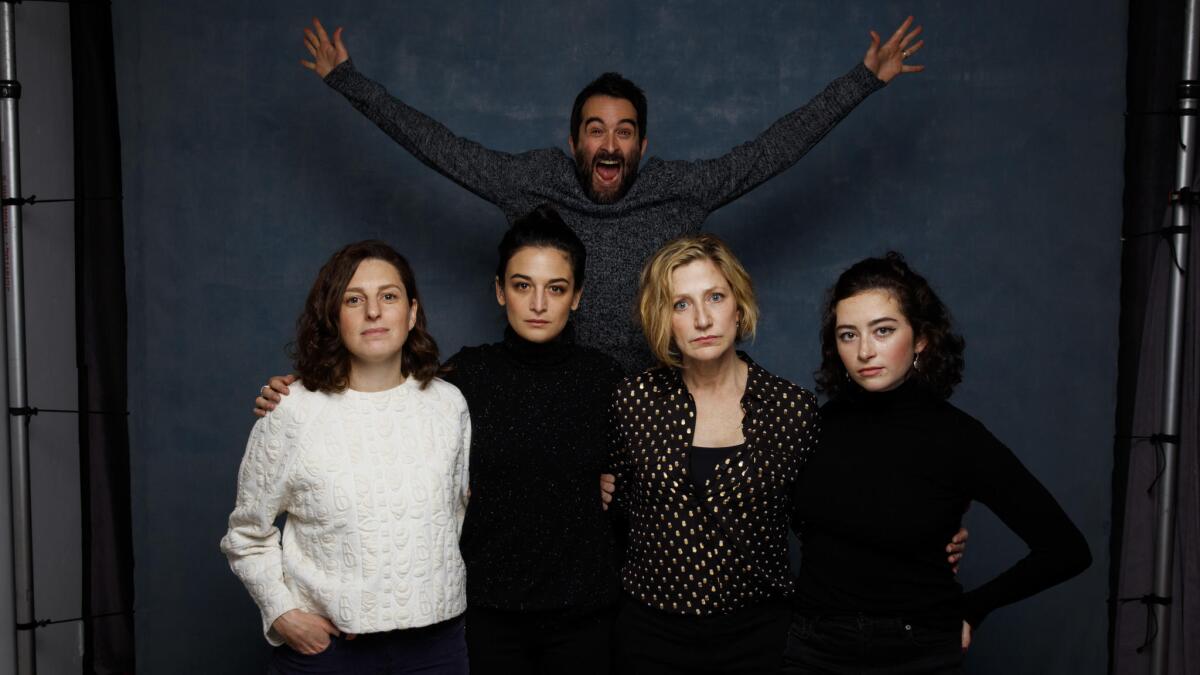
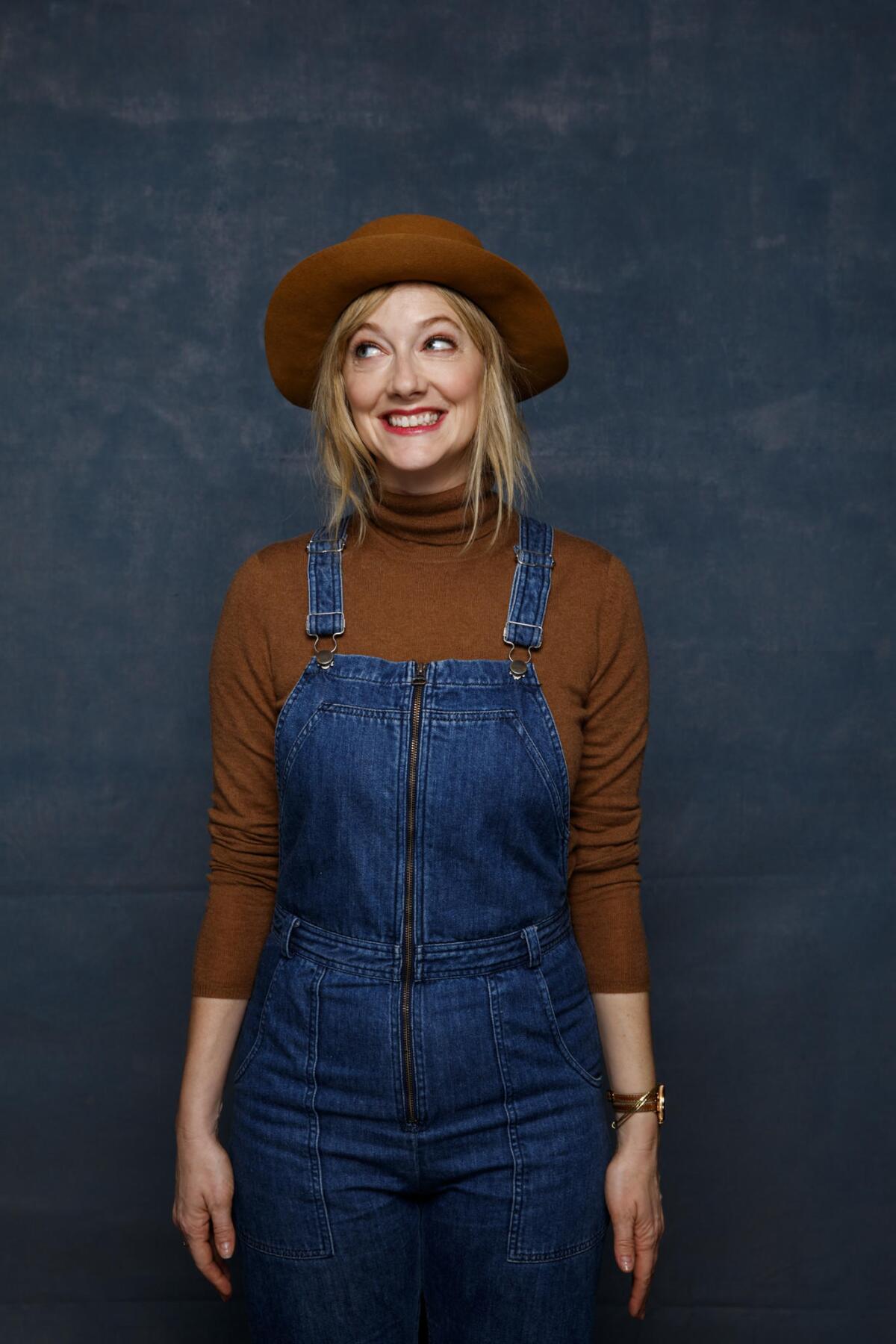
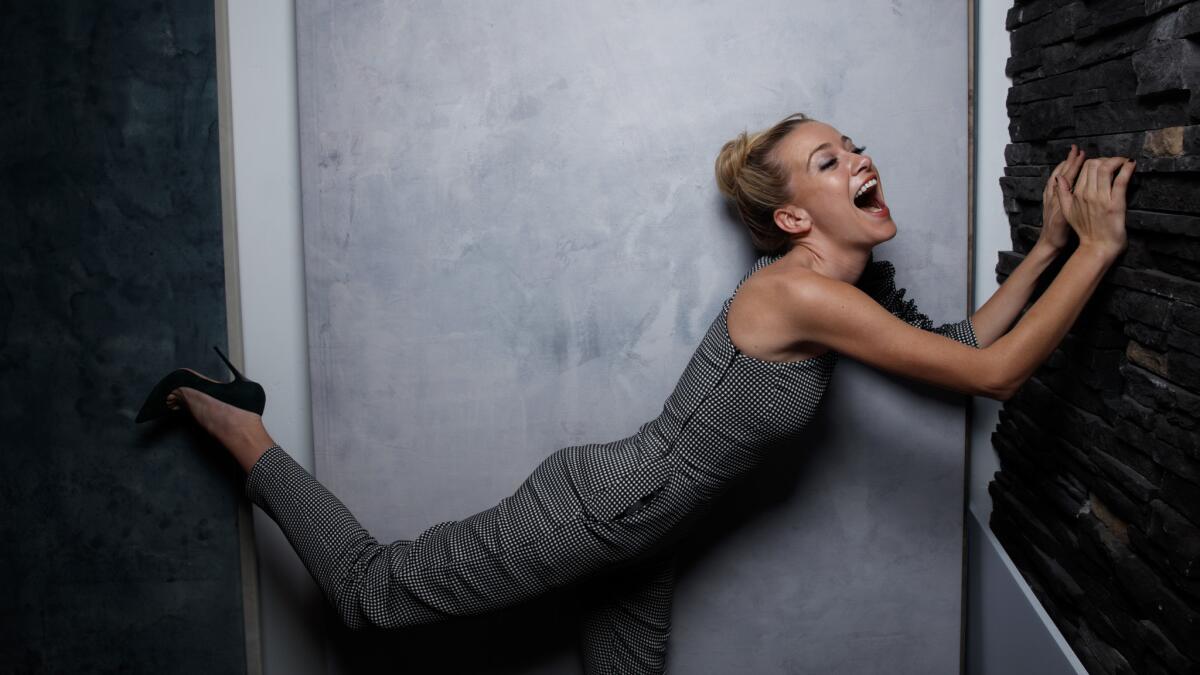
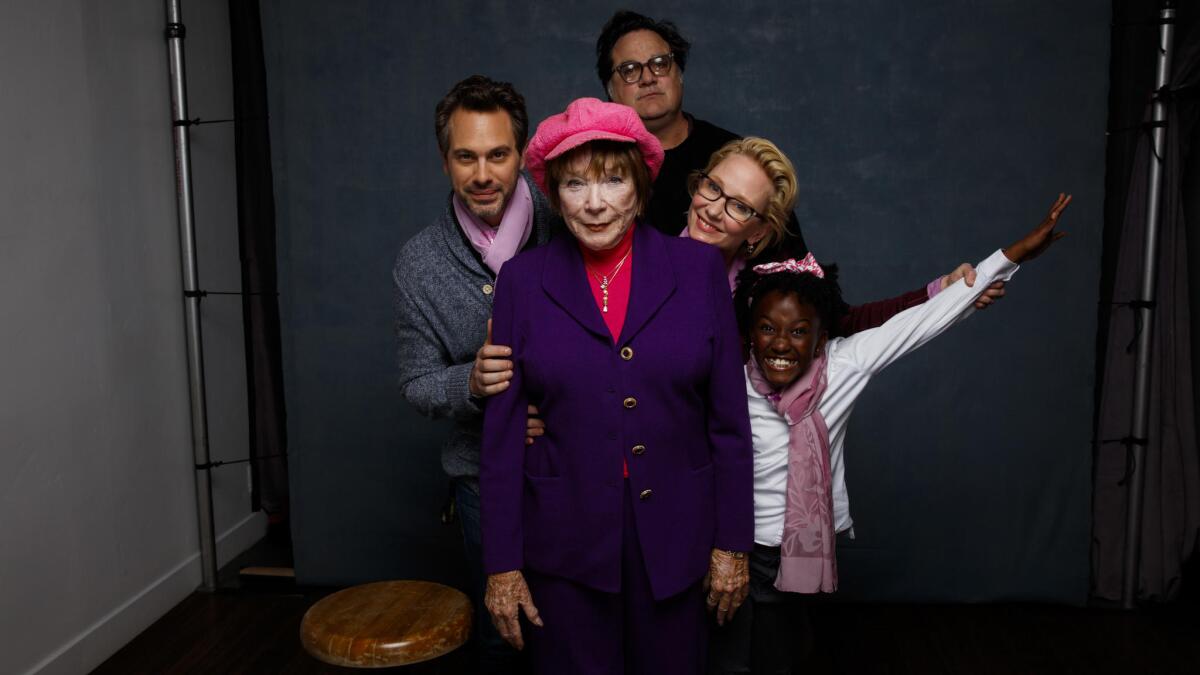
Shailene Woodley, protesters urge Sundance to axe ties with DAPL-funding sponsor
Monday afternoon actress-activist Shailene Woodley joined #NoDAPL protesters marching into the heart of the Sundance Film Festival to challenge Robert Redford’s Sundance Institute to put its money where its mouth is: Cut ties to festival sponsor Chase Bank over its funding of the Dakota Access Pipeline.
“There is a hypocrisy in talking about indigenous cultures but not doing anything, as a non-native ally, to stand with them,” Woodley said in a live video posted to her Facebook page from the protest, which made its way down Main Street in Park City, Utah, in even harsher conditions than those that greeted Chelsea Handler and other Hollywood stars on Saturday.
Two days earlier, 8,000 protesters joined a celebrity-led Women’s March to oppose the incoming administration of President Trump, marching and chanting down the same snow-covered roads.
Monday’s group of water protectors carrying anti-Dakota Access Pipeline signs and banners purposefully made their way down Main Street to take up signs in front of the Chase Sapphire Lounge -- a sponsored venue that is hosting high-profile events and premiere after-parties throughout the Sundance Film Festival.
Chase Bank is also a presenting sponsor of the 2017 Sundance Film Festival and has a major presence at the annual fest historically known for its activist streak.
St. Vincent and Roxanne Benjamin on directing ‘XX’

Singer-songwriter St. Vincent and Roxanne Benjamin talk about directing the anthology “XX.”
Singer-songwriter St. Vincent and Roxanne Benjamin talk about directing the anthology “XX.” Video by Myung Chun / Los Angeles Times
Gigi Gorgeous documents ‘the real me’ as an education in transgenderism

Transgender vlogger Gigi Gorgeous says, ”I’ve always felt that sharing my story was the best way to educate people.” Now she has a documentary, “This Is Everything: Gigi Gorgeous.”
YouTube superstar Gigi Gorgeous on her Sundance documentary “This Is Everything” (in theaters February 3 and on YouTube Red February 8), which chronicles her journey from beauty vlogger to millennial transgender icon, directed by Oscar-winning filmmaker Barbara Kopple (“Miss Sharon Jones!”). Video by Myung Chun / Los Angeles Times
Kumail Nanjiani and Emily V. Gordon tell their love story - and its twists - in ‘The Big Sick’

Husband and wife Kumail Nanjiani and Emily V. Gordon relay a fictionalized version of their lives in “The Big Sick.” The movie was recently acquired by Amazon Studios for $12 million.
Husband and wife Kumail Nanjiani and Emily V. Gordon relay a fictionalized version of their lives in “The Big Sick.” The movie was recently acquired by Amazon Studios for $12 million. Video by Myung Chun / Los Angeles Times
Kenneth Turan’s Sundance documentary picks

L.A. Times film critic Kenneth Turan shares his documentary picks from the first weekend of the Sundance Film Festival.
L.A. Times film critic Kenneth Turan shares his documentary picks from the first weekend of the Sundance Film Festival. Video by Myung Chun / Los Angeles Times
Olivia Cooke and Anya Taylor-Joy of ‘Thoroughbred’

Olivia Cooke and Anya Taylor-Joy star in the dark Sundance film “Thoroughbred.”
Olivia Cooke and Anya Taylor-Joy star in the dark Sundance film “Thoroughbred.” Video by Myung Chun / Los Angeles Times
Justin Chang’s surprise Sundance pick

L.A. Times film critic Justin Chang found a pleasant surprise in the Sundance film “Before I Fall.”
L.A. Times film critic Justin Chang found a pleasant surprise in the Sundance film “Before I Fall.” Video by Myung Chun / Los Angeles Times
Critics Kenneth Turan and Justin Chang discuss first week

L.A. Times film critics Kenneth Turan and Justin Chang share their likes from the first weekend of the Sundance Film Festival.
L.A. Times film critics Kenneth Turan and Justin Chang share their likes from the first weekend of the Sundance Film Festival. Video by Myung Chun / Los Angeles Times
Government corruption and big-wave fever: Two documentaries look at California’s fraught relationship with water
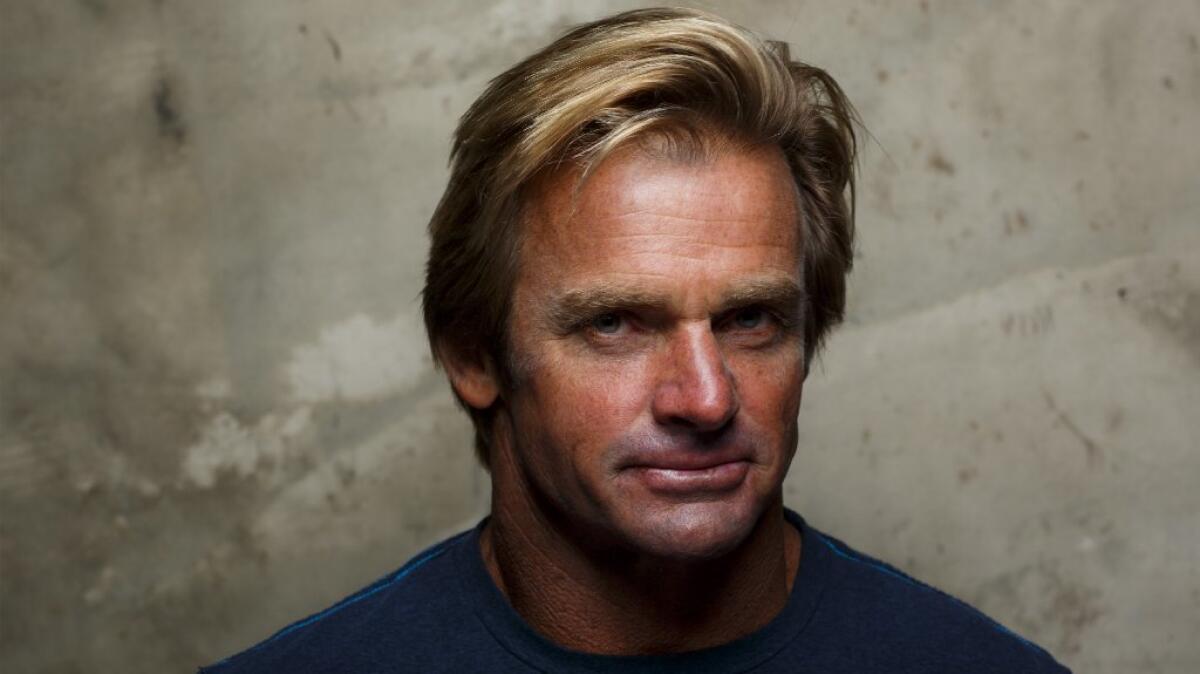
Marina Zenovich holds up a glass and looks hard at the clear liquid inside. “Water is right there, we see it every day. It’s something we all need, but we don’t necessarily know where it comes from.”
Rory Kennedy looks out a window at a snowy mountain and talks about seeing Laird Hamilton “surf these avalanches of water. It was really incredible, there is some awe and wonder that I will admit to.”
California may be the Golden State, but given how important water is both to our survival living in a desert and to our image as home to surfer culture, maybe the Aqua State would be a more fitting name.
In one of those only-in-Sundance coincidences, two excellent documentaries dealing with different aspects of that essential liquid are debuting here: Zenovich’s “Water & Power: A California Heist,” a scalding investigation of the politics of water, and Kennedy’s “Take Every Wave: The Life of Laird Hamilton,” a compelling look at the remarkable achievements and unbending personality of a legendary surfing innovator.
In another coincidence, both documentaries are departures from their directors’ usual focuses.
Kennedy (“Last Days in Vietnam,” “Ghosts of Abu Ghraib”) smiles and says “most would agree that this is an unusual pairing to say the least” for a filmmaker whose “passion is pretty hard-hitting documentaries about social issues, paying attention to people who don’t have a voice. This was not that.”
Zenovich, best known for “Roman Polanski: Wanted and Desired” and “Richard Pryor: Omit the Logic,” grins as well when she jokes, “Maybe Rory should have made my movie and I should have made hers.”
Yet not only do both documentaries turn out exceptionally well, both have factors that connect to the filmmakers’ life and work in an essential way.
Zenovich for her part says, “I make films about difficult men,” which includes the water barons who are at the heart of her investigation into a situation so suspicious that when executive producer Alex Gibney pitched it to her he called it “‘Chinatown,’ the Documentary.” More than that, Zenovich turns out to have a strong connection to both politics and California’s Central Valley, the documentary’s ground zero.
Janicza Bravo’s oddball ‘Lemon’ is tart and sweet
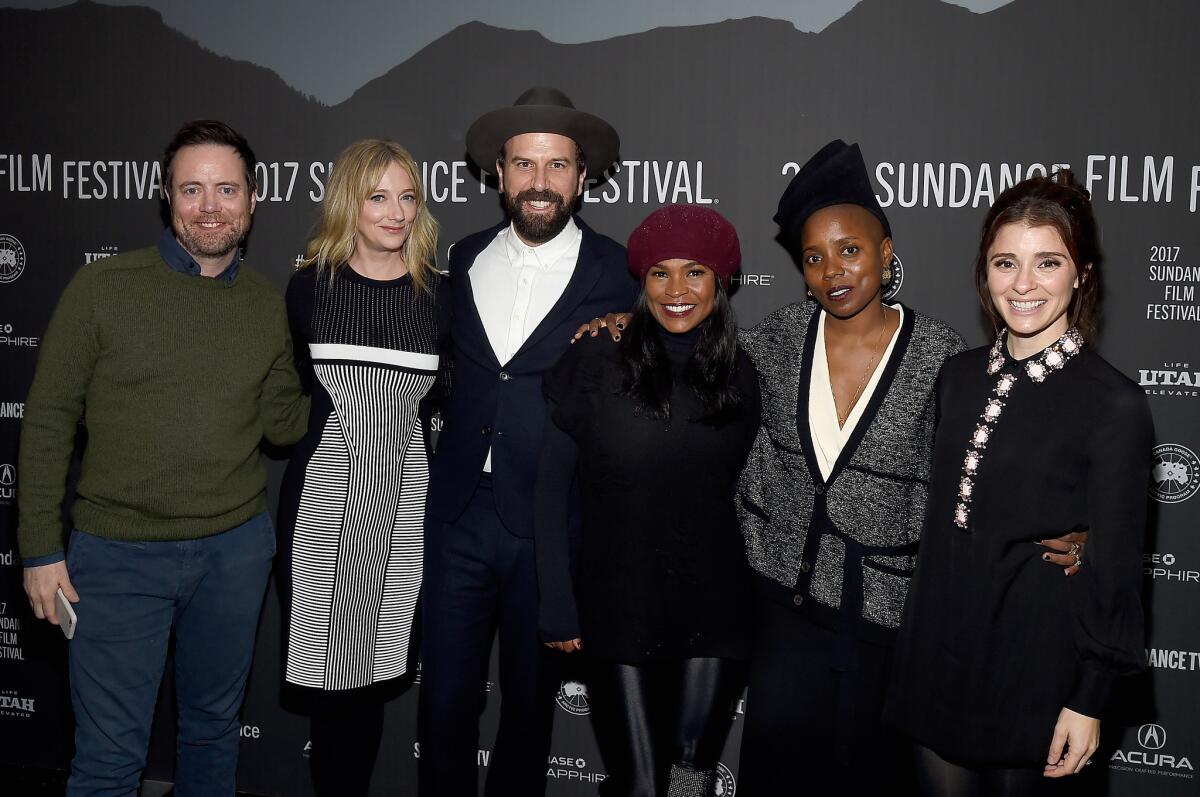
Earlier in the weekend a Sundance programmer introduced a film in the festival’s Next section by saying, “It is the best section of the festival where we show the coolest movies.” That was born out on Sunday night at the world premiere of the Next title “Lemon,” the tartly sweet feature debut for director Janicza Bravo.
Bravo won the festival’s short film grand jury prize with her “Gregory Go Boom” in 2014 and directed an episode of the Golden Globe winning television show “Atlanta.” Before the screening of “Lemon,” Sundance director of programming Trevor Groth introduced Bravo by calling her work “so audacious, so visionary” and adding, “I feel like she should already be a household name. It’s shocking to me that this is her first feature.”
Introducing the film, Bravo said, “I can’t believe this is happening. Hell’s bells. I could … my pants and it would totally be fine, I wouldn’t mind it at all. I’ve wanted this for so long. I really want to say something magical and special right now, but I felt breezy all day and I suddenly feel not breezy at all.
“Thank you to everyone who said yes to me. Thank you to everyone who said no, you jerks,” she added. “I cherish this moment, I have wanted to be in a room like this with people like you having this moment and I can’t believe it’s happening and I get to be a part of it. I will never, ever forget this, unless I have some kind of degenerative brain disease that eats away at my brain then I won’t remember. But until then I will remember.”
Co-written by Bravo and Brett Gelman, the film follows the travails of Isaac Lachmann (played by Gelman) as he undergoes a moment of crisis. His longtime girlfriend (Judy Greer) is in the process of leaving him, the small theater production he is directing isn’t going well, his acting career is stalled and his family is a pit of bad feelings. A woman he meets through work (Nia Long) provides one possible bright spot.
The Sunday night audience burst into applause during the movie after a post-Seder dinner family sing-along of the tune “A Million Matzoh Balls” including Gelman, Shiri Appleby, Martin Starr, Fred Melamud, Rhea Perlman and David Paymer. In the history of Sundance moments of family dysfunction, this may be a new classic.
After the movie Bravo brought up nearly 20 members of the cast and production team, including actresses Long, Greer and Appleby. Bravo noted that she and Gelman, a couple in real life, began writing the project some five years ago.
Gelman continued, “When she came up with the idea for this movie it was sort of a moment in time where we were very nervous about where we were at in our lives,” Gelman said. “It was fear that we had and we felt a lot of people had when you wake up one day and you’re like where am I in my life, how did I get here? I felt like this was going to be different. And do I even have the tools to make it better at all? So we addressed that.”
“They’re really just amalgamations” Bravo added of the characters. “We’re very anxious, and worried and concerned. We read chill, but [we’re] not chill a lot. So all of these amalgamations are of those feelings.”
Composer Heather Christian, a long-time collaborator who has worked with Bravo on her short films and on theater pieces, described how they used instrumentation to reflect the different characters and moods and to reference Chekhov’s “The Seagull,” which is seen being performed by Michael Cera and Gillian Jacobs in a few short scenes.
“It’s a sneaky nerdy kind of way to go slightly askew,” Christian said, in not a bad summation of the film itself.
“Great, solid answer. I like that,” Bravo replied. “That’s my review.”
Kristen Stewart directed a film about her past breakups (and maybe Robert Pattinson)
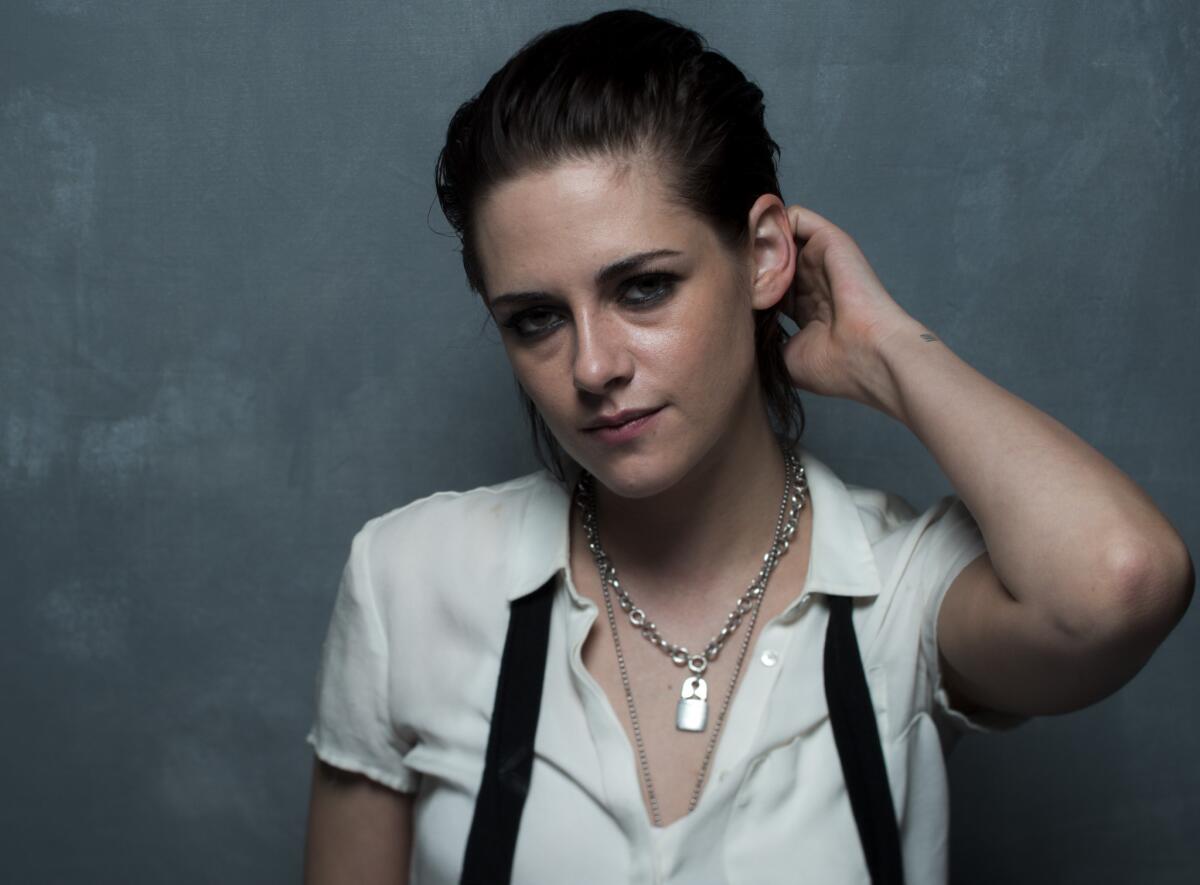
Kristen Stewart knows the kind of thoughts people are going to have about her directorial debut. And she’s not especially concerned with them.
“I wasn’t fearful in confronting what this was about,” the star said of her new work, a short film titled “Come Swim.” “I mean, I put a relationship right in the middle of it.”
Stewart’s fame these days comes primarily from two areas: her relationships, which draw the interest of tens of millions of people, and her studiously independent film work, which garners the ticket sales of, well, somewhat fewer.
Those two strands converge in “Come Swim,” a piece that pushes the 26-year-old in ever-new artistic directions while also offering some of the clearest tea leaves yet about her closely guarded personal life.
America Ferrera on activism and art

Actress America Ferrera shares her thoughts on speaking at the Women’s March on Washington, the need for diversity in Hollywood and the purpose of art today.
America Ferrera shares her thoughts on speaking at the Women’s March, the need for diversity in Hollywood and the purpose of art today. Video by Myung Chun / Los Angeles Times
The casts of ‘Newness,’ ‘Ingrid Goes West,’ ‘Give Me Future’ and more hang at the L.A. Times photo studio at Sundance
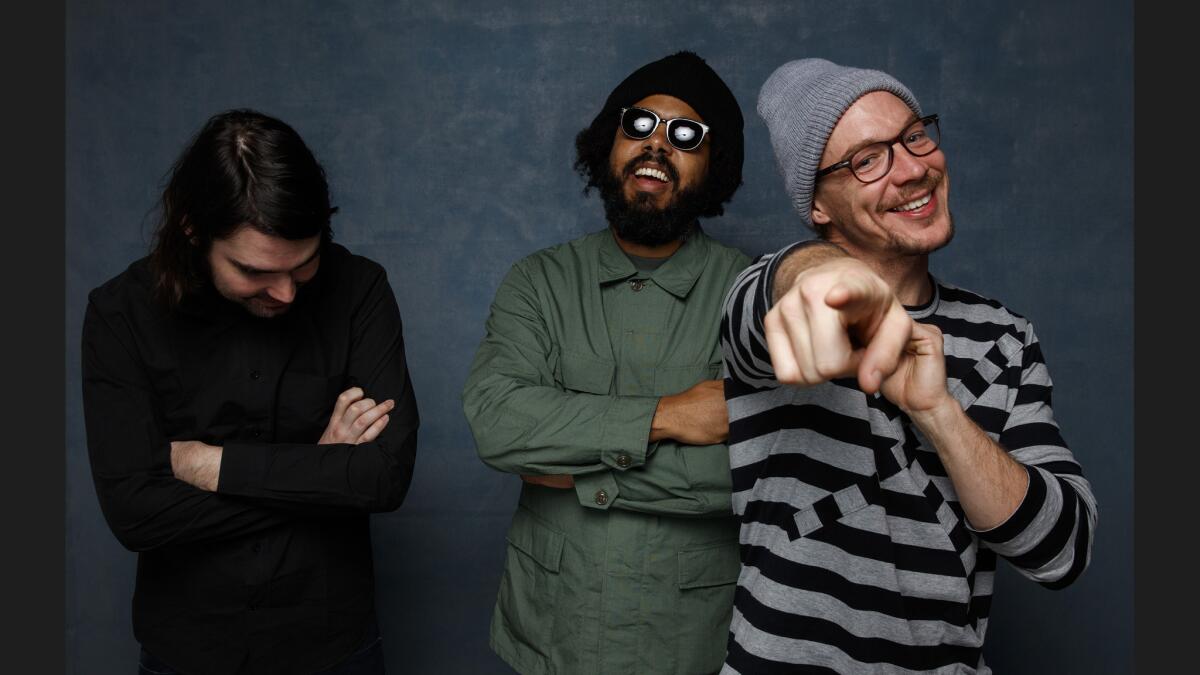
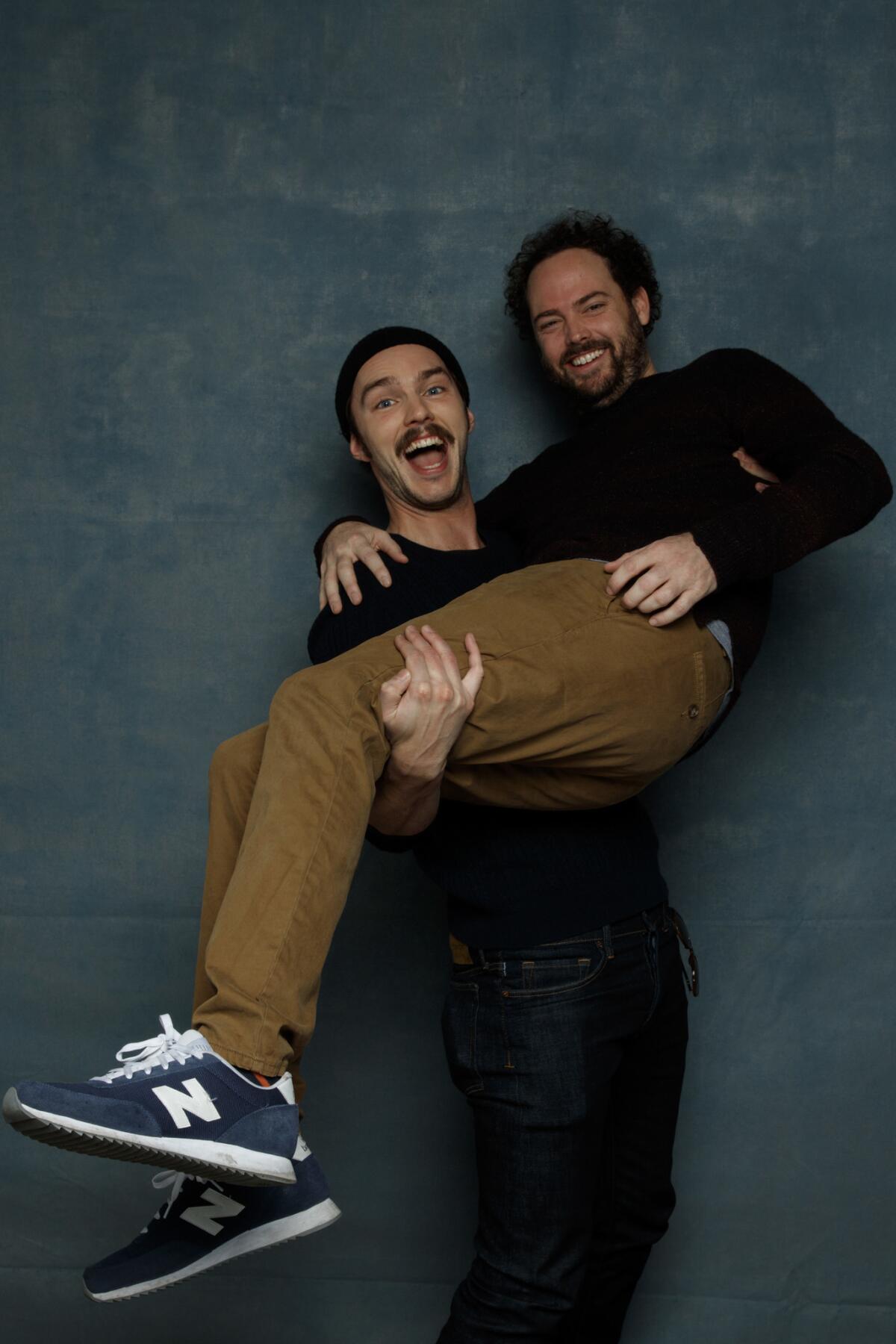
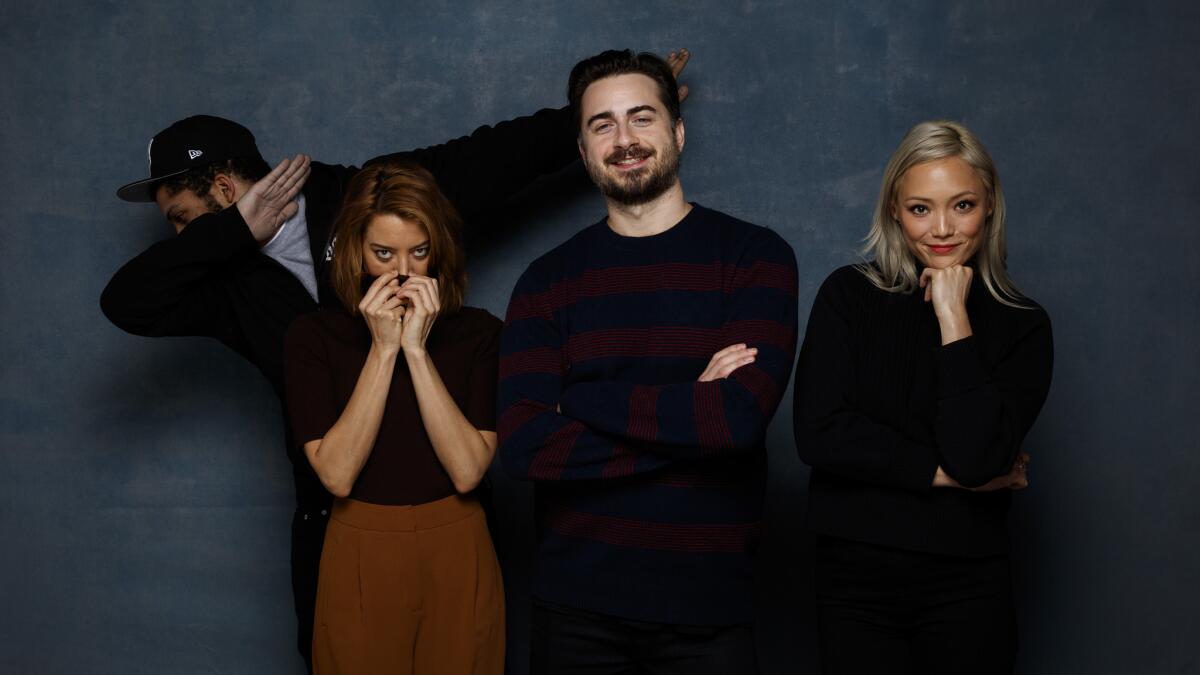
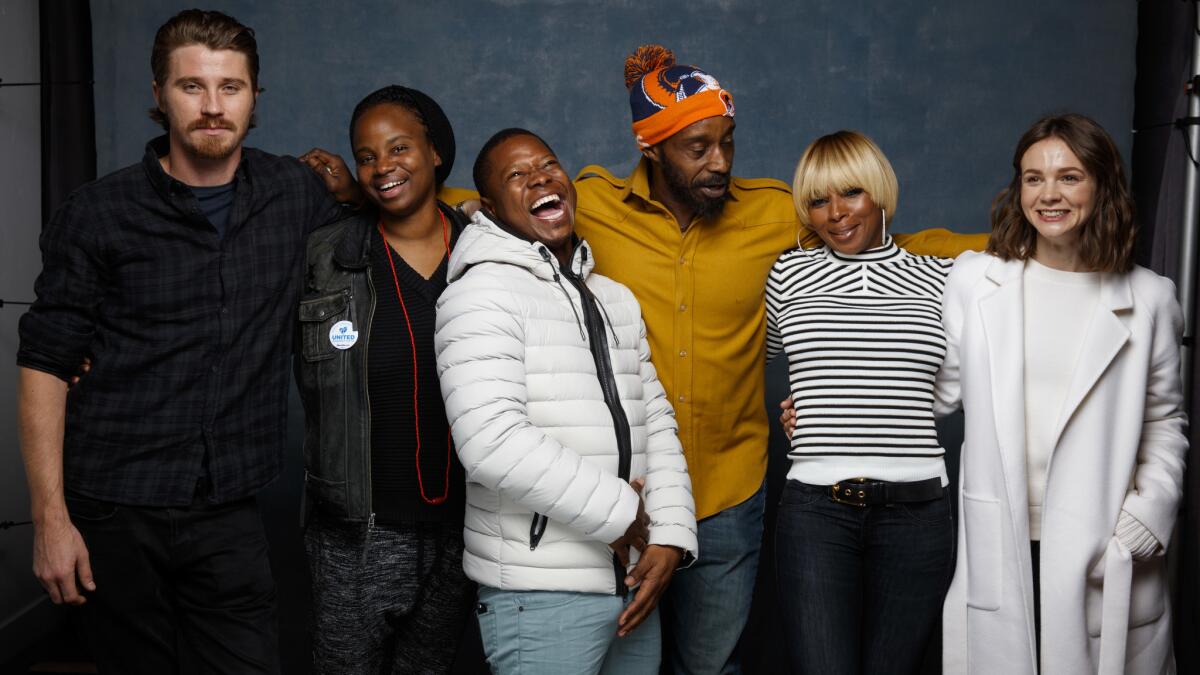
Critic’s Notebook: ‘The Big Sick’ offers an early cure for the festival blues
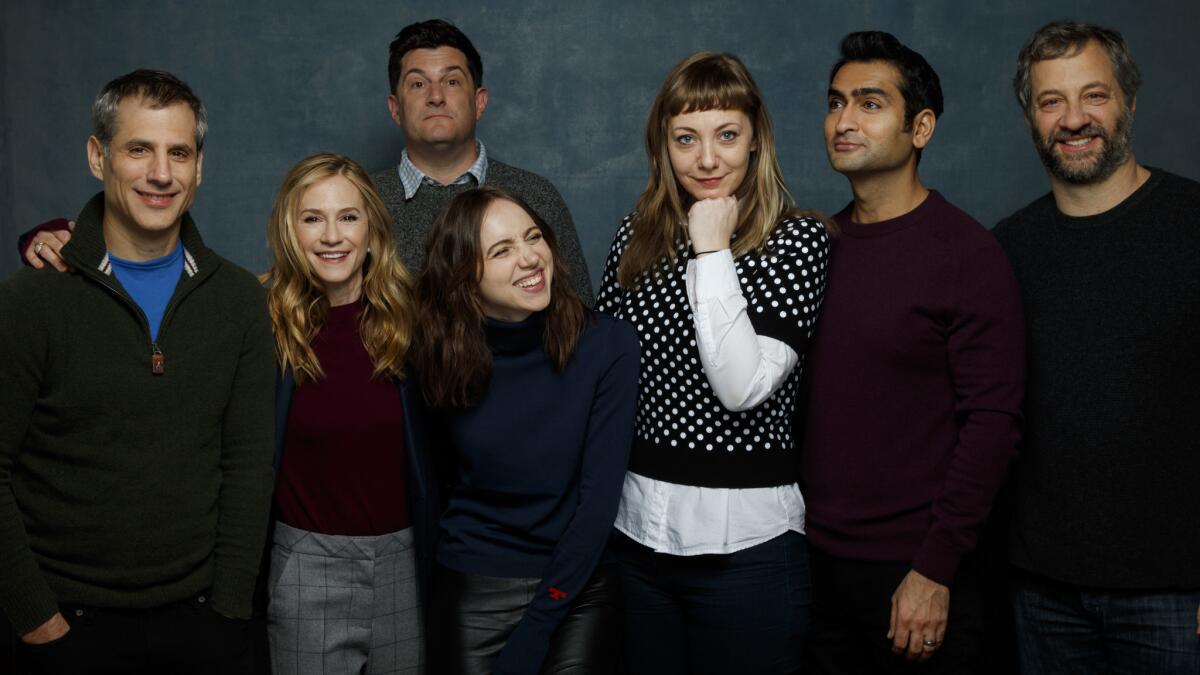
The Sundance Film Festival’s early days may have been overshadowed by the one-two punch of Friday’s presidential inauguration and Saturday’s women’s marches, but this 33rd annual edition has slowly but surely roused itself to life. The festival laid claim to its first major crowd-pleaser on Friday with the world premiere of director Michael Showalter’s “The Big Sick,” an effortlessly funny and charming romance that subtly deepens into a moving portrait of cross-cultural, cross-generational bonds.
Acquired by Amazon Studios for $12 million after a heated bidding war, “The Big Sick” is drawn from the life of “Silicon Valley” actor Kumail Nanjiani, who stars as a younger (but present-day) version of himself. A Pakistani American man struggling to succeed as a stand-up comic in Chicago, Kumail has a very public meet-cute with a friendly heckler named Emily (Zoe Kazan). And so begins a relationship marked by startling emotional highs and lows, but mostly by a generous stream of laughter — and while Kumail may be a professional in that department, he wisely doesn’t monopolize the jokes, as Emily’s spiky sense of humor both matches and complements his own. (Nanjiani co-wrote the script with Emily V. Gordon, his wife.)
The involvement of producer Judd Apatow can be seen in the roundedness of the characterizations and the pleasing messiness of the movie’s emotional texture. But Nanjiani’s immigrant identity opens up an entirely new dimension of the Apatovian universe for him to colonize. In the movie, Kumail is too scared to break the news about his white girlfriend to his strict Muslim parents, who only want him to settle down with a nice Pakistani American girl.
Watching “The Big Sick” brought back memories of two recent projects that addressed the generation gap as it relates to Indian American families. Like Aziz Ansari’s character in the Netflix series “Master of None,” Kumail is an aspiring entertainer trying to deal with his tradition-minded parents. And like the documentary “Meet the Patels,” “The Big Sick” holds up the culture of arranged marriages for detailed comic scrutiny.
Sundance and Will and Jada Pinkett Smith foundation team up
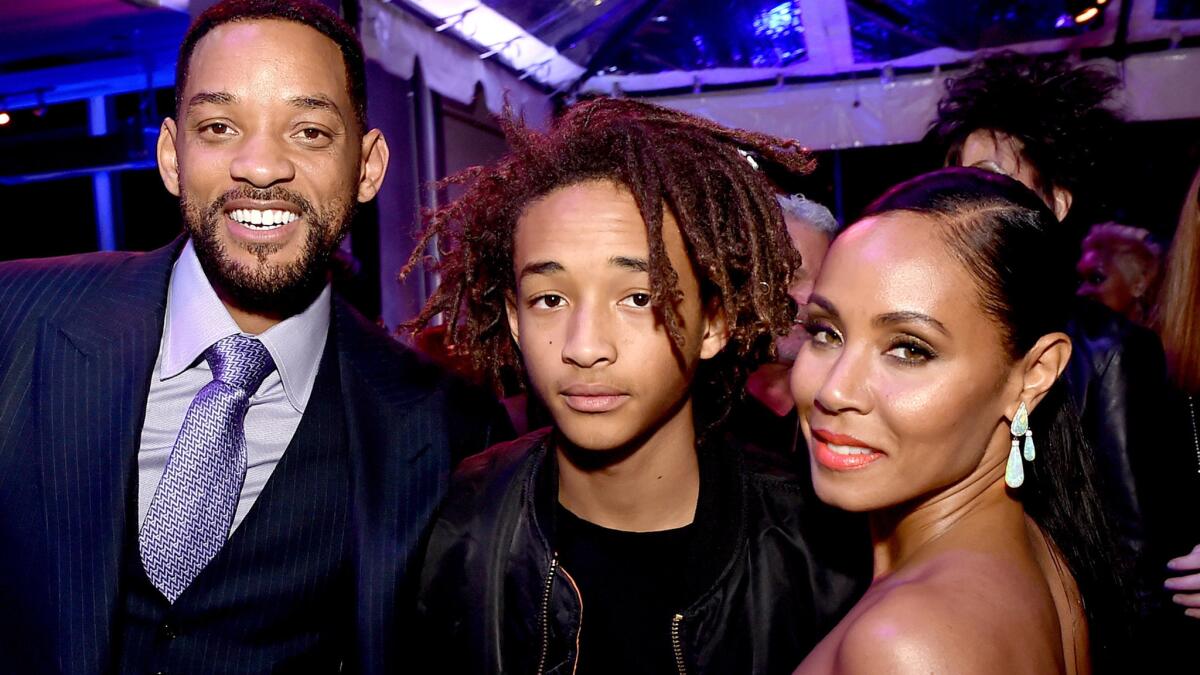
One of Sundance’s stated goals is to increase diversity both at its festival and its talent-incubating labs.
That effort received a boost Sunday when the organization announced that the Will & Jada Smith Family Foundation would lend financial support the Sundance Institute’s Screenwriters Intensive program.
The Intensive program offers a two-day workshop to a number of screenwriters from underrepresented communities, and also works with the Diversity Initiative. The grant has been set up for two years; the amount of the donation was not disclosed.
In a statement, Sundance Institute Executive Director Keri Putnam said that, with the help of the Smith foundation, “we will build momentum and awareness about the need to create a film and media landscape that reflects the full richness and diversity of our culture.”
Jada Pinkett Smith noted that that the goal of the partnership was to “cultivate stories and storytellers reflective of the world at large.”
At a time when Hollywood has been criticized for a lack of minorities in many creative roles, Sundance has been a refreshing counter-example, both at the labs and the festival. This year’s festival has seen a number of movies written by people of color, including two early breakouts—the Kumail Nanjiani-written “The Big Sick” and the Dee Rees- and Virgil Williams-written “Mudbound,” which both premiered to strong receptions this weekend in Park City.
Sean Hayes and Todd Milliner on ‘The History of Comedy’

Sean Hayes and Todd Milliner, at Sundance for their documentary, “The History of Comedy,” do some bits of their own in a sit-down with The Times. Video by Myung Chun / Los Angeles Times
Sean Hayes and Todd Milliner, at Sundance for their documentary, “The History of Comedy,” do some bits of their own in a sit-down with The Times. Video by Myung Chun / Los Angeles Times
Diplo talks about celebrity culture in Cuba

Grammy-winning disc jockey, producer and songwriter Diplo comments on the lack of celebrity culture in Cuba, where he performed for the Sundance documentary, “Give Me Future.” Video by Myung Chun / Los Angeles Times
Grammy-winning disc jockey, producer and songwriter Diplo comments on the lack of celebrity culture in Cuba, where he performed for the Sundance documentary “Give Me Future. Video by Myung Chun / Los Angeles Times
Polaroid-style instant prints from the L.A. Times photo studio at Sundance
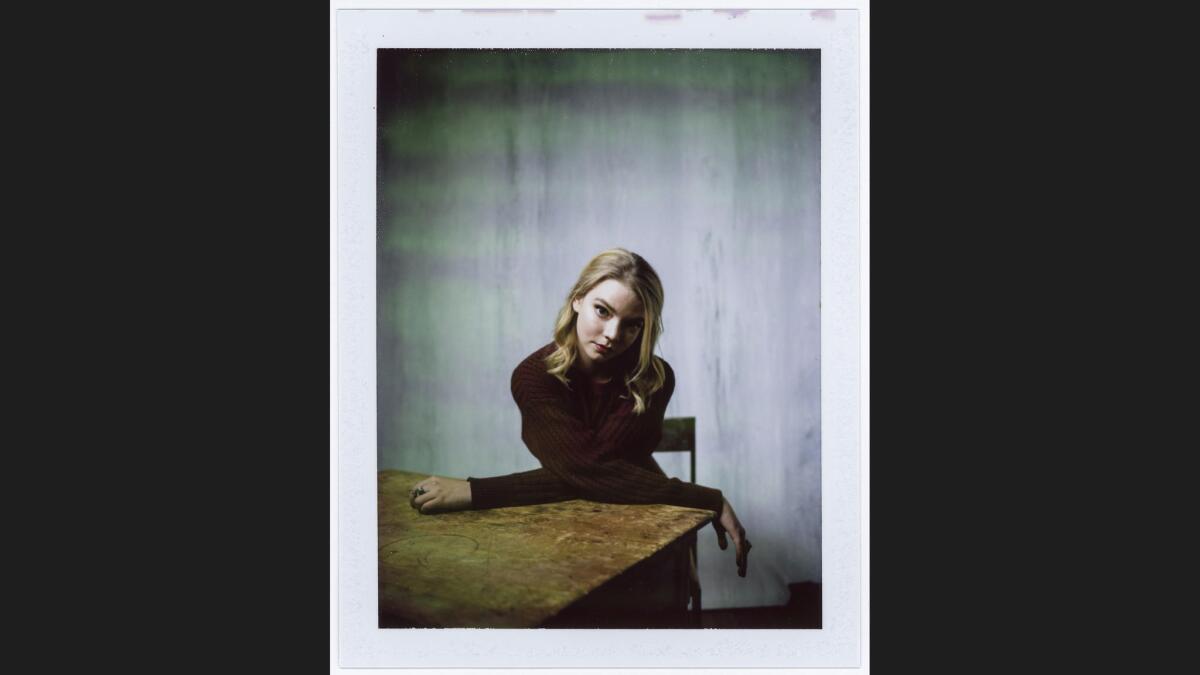
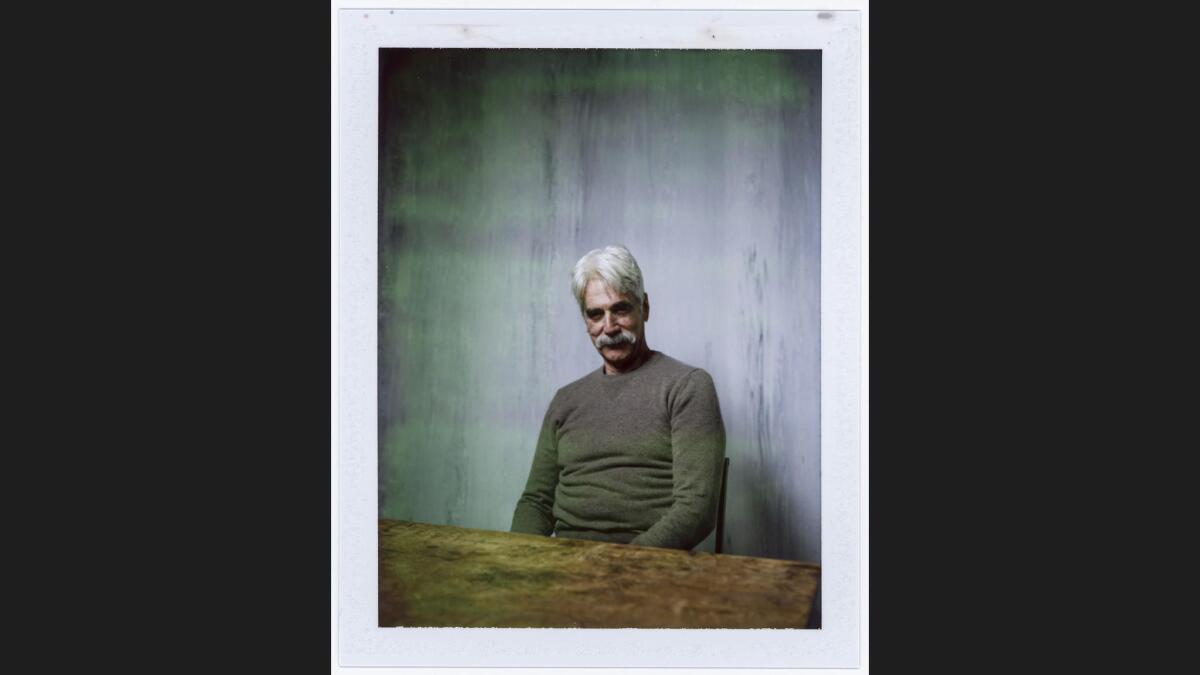
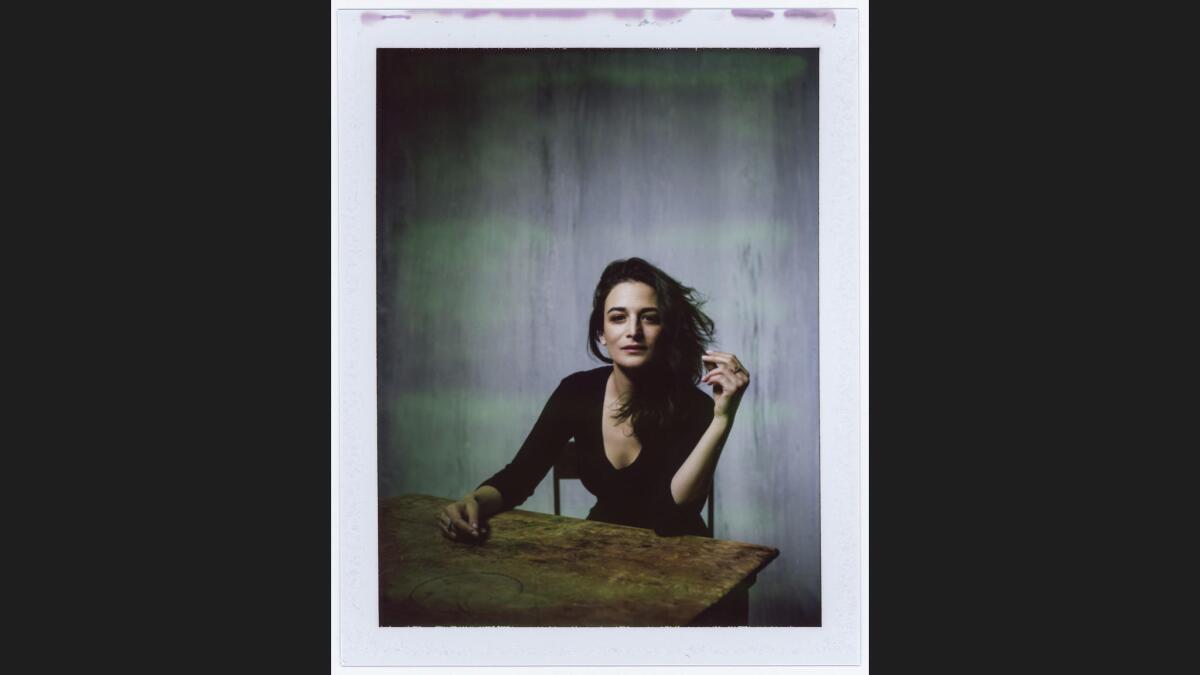
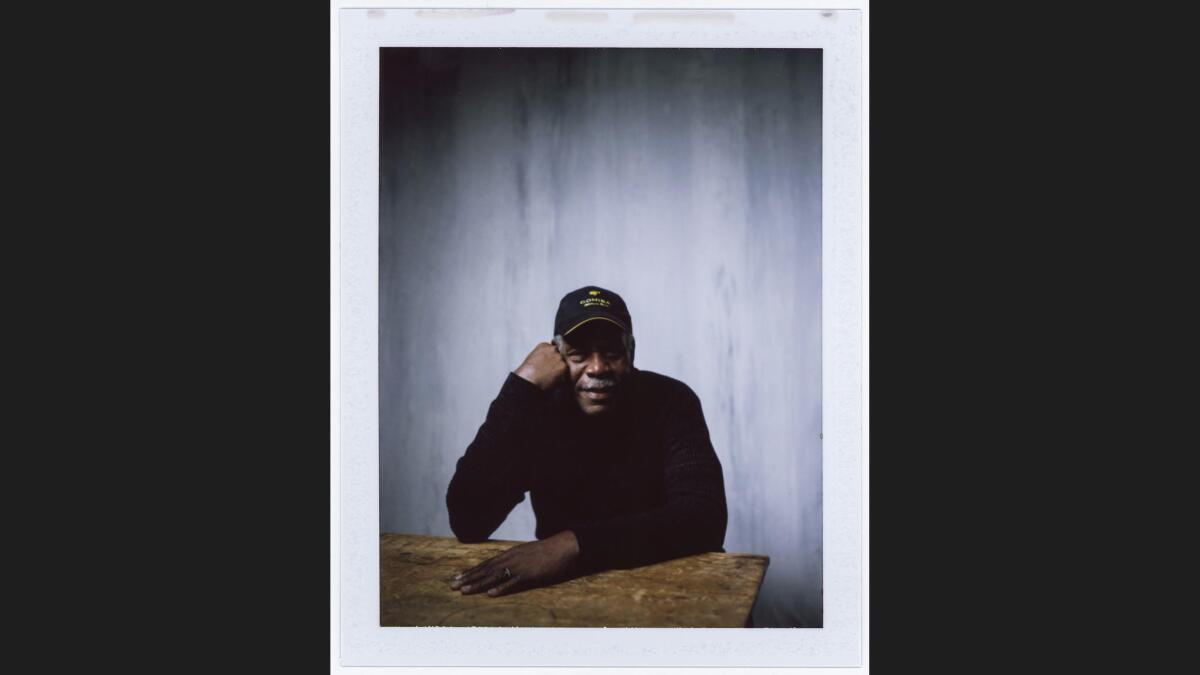
SEE MORE POLAROID-STYLE PORTRAITS FROM THE L.A. TIMES PHOTO STUDIO HERE >>
‘The Big Sick’ is a festival anomaly: the comedy of Judd Apatow with the tender drama of Sundance
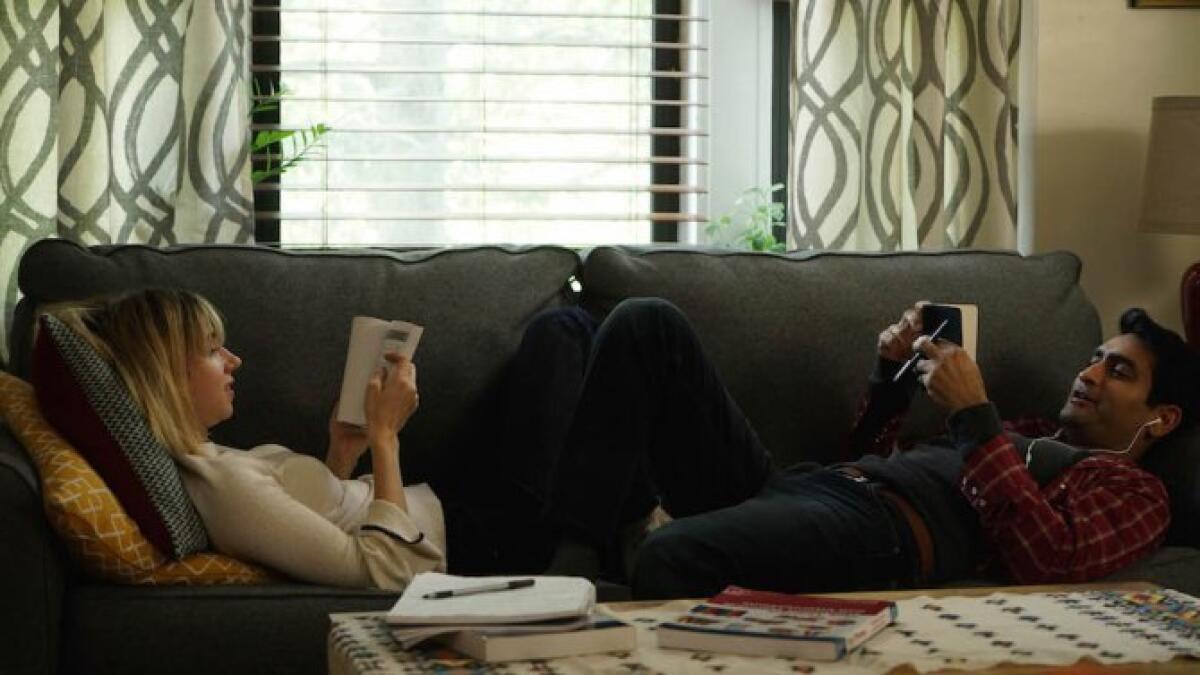
Not long into “The Big Sick,” the new film produced by Judd Apatow, the lead character makes a choice one rarely sees in a mainstream U.S. comedy.
A young Pakistani Muslim visiting his parents for dinner tells them he’s going downstairs to pray, per their wishes. Then he heads to the basement, takes out a prayer mat, sets a timer for 5 minutes and does everything but pray before returning upstairs when the clock runs out.
Many comedies — and certainly many comedies under Apatow’s guiding hand — would play the scene for maximum (and likely raunchy) laughs. (In many comedies the lead character wouldn’t be a Pakistani Muslim either, but that’s another matter.) Yet a more serious tone percolates here. The son has given up tradition, but hardly happily, and there’s something a little touching, even sad, about him having to conceal his choice.
The moment provides a signal early of a film far more interested in sympathizing with alternate points of view than in exploiting them for easy laughs. That idea is underscored later when the characters and his parents argue angrily about the assimilationist direction their son’s life is taken — a scene you’d more likely find in a Salman Rushdie novel than the film of a man who made “Knocked Up.”
At Sundance, Hollywood stars rally against Trump: ‘This is a new America’
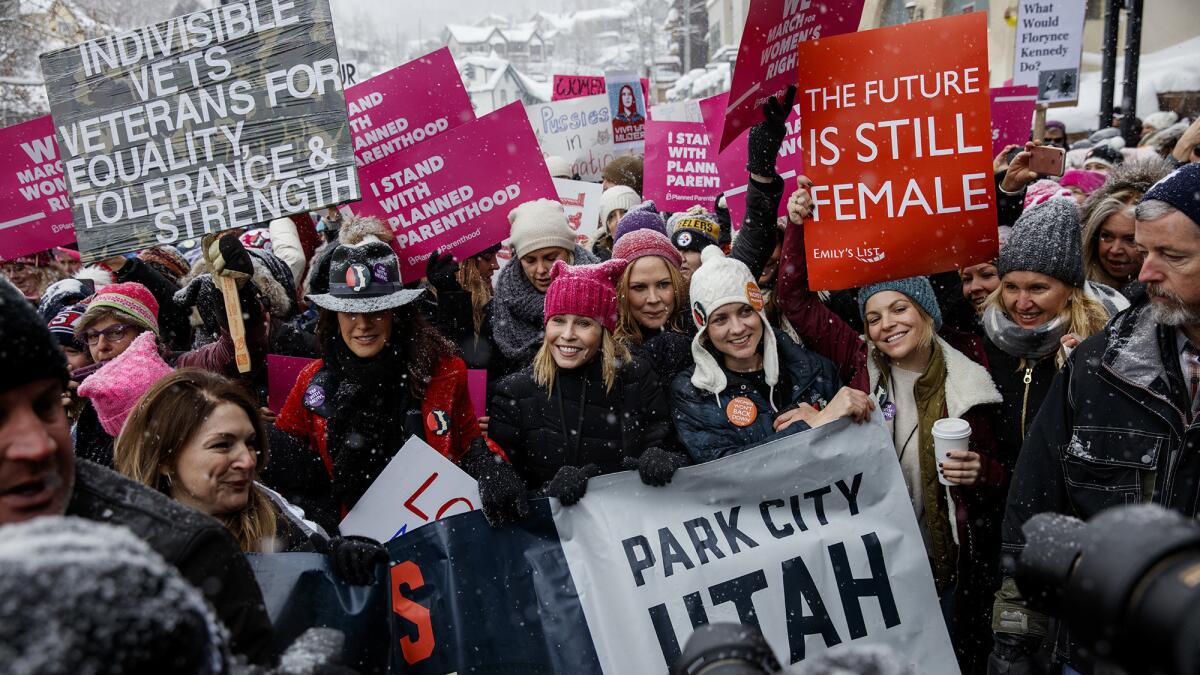
While Donald Trump spent his first full day as the president of the United States warring with journalists over inauguration attendance numbers, Hollywood stars in Utah for the Sundance Film Festival added their voices to the protests around the globe.
Led by comedian Chelsea Handler, an estimated 8,000 protesters flooded the mountain town of Park City, Utah, to voice their objection to Trump and call for solidarity — far exceeding the predicted turnout.
“Today’s a beautiful day and nothing can take that away,” Handler told The Times on Saturday in Park City, and said she was determined to keep the momentum going after the Women’s March on Main.
“The only other option is fear,” she said, “and I won’t be fearful.”
Tom Brokaw: From the Trump inauguration to Sundance
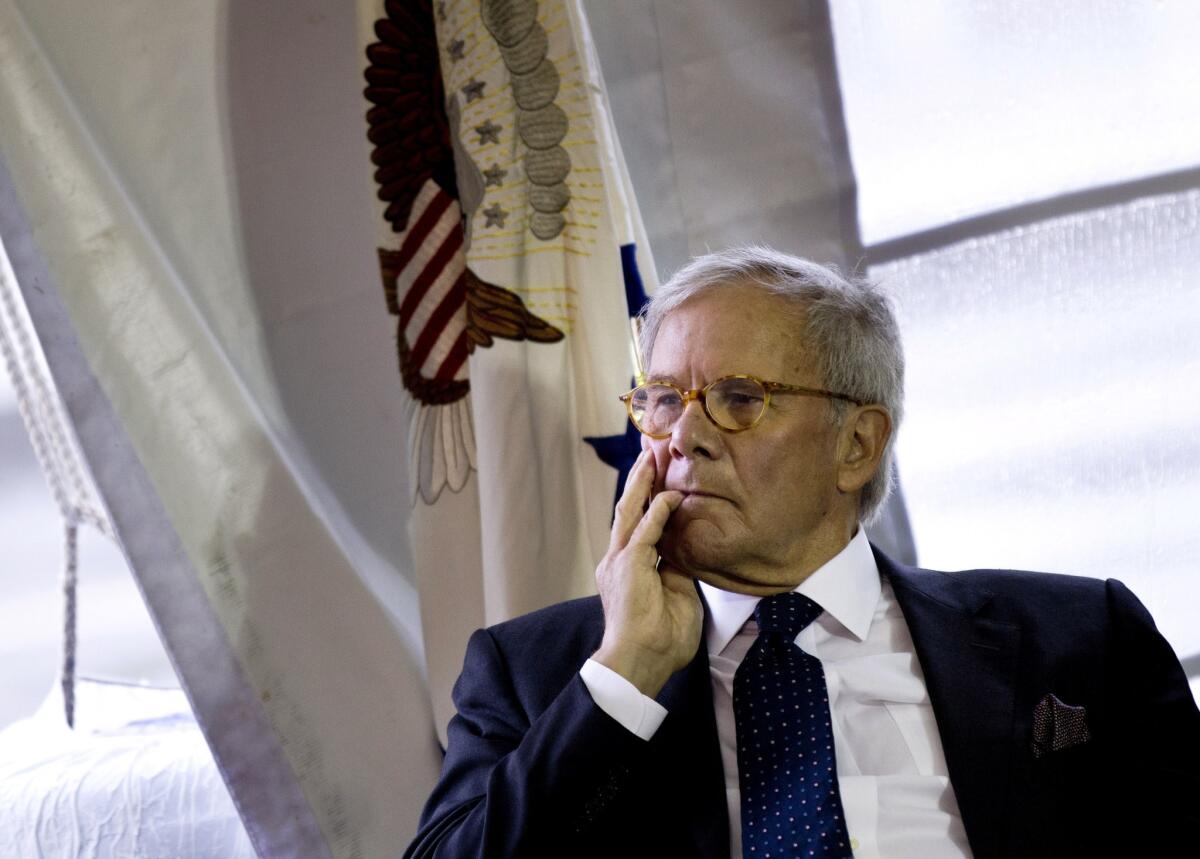
On Friday, Tom Brokaw was in Washington, D.C., helping to lead NBC News’ coverage of President Trump’s inauguration. Less than 24 hours later — as thousands of women marched through the heart of Sundance mid-snowstorm to protest the new administration — the veteran newscaster touched down in Utah to promote a documentary.
Culture shock much?
“I’ve been doing this for a long time, and that one was — to put it lightly — unique,” the 76-year-old said of the inauguration. “Most presidents who deliver State of the Union addresses try to do something that is lyrical, poetic and historically contextual. He did not. It was another campaign speech — which was his intention. He’s going to run the White House as if his campaign never stopped.”
Sipping a Diet Coke, Brokaw had just traveled from the airport to a local Ruth’s Chris Steak House, where he joined David Zaslav, president and chief executive officer of Discovery Communications, and Rich Ross, president of the Discovery Channel, to discuss “Rancher, Farmer, Fisherman.” That’s the new movie Discovery has at the festival, which explores three subjects who are finding sustainable ways to live off the land.
The film is part of the company’s renewed focus to “stand up for the environment and animal extinction,” said Zaslav. After working with Brokaw for more than two decades at NBC, the executive reached out to Brokaw to see if he’d be interested in narrating the new documentary.
“As the chronicler of the greatest generation — which, at its heart, was about people standing up for a greater good — I thought he was the perfect voice,” Zaslav said.
Brokaw, who has a ranch in Montana, has long been interested in environmental preservation. He was raised near large farming areas in South Dakota and grew up fishing on the Missouri River. And while he’s in Utah, he’s staying with Robert Redford, the festival founder who was largely responsible for the creation of this year’s New Climate program focused on environmental films.
Brokaw said he agrees with documentary’s overall message of conservation — advocating practices such as no-till farming — and believes that anyone who suggests we ought to stop eating animals or farming altogether is an extremist.
“That’s crazy. You’ve gotta have a sustainable economy,” he said. “You can’t just say ‘we’re not gonna do that.’ You have to have enlightened environmentalists who say we can have what we want, but we have to manage it more skillfully.”
“We’re not trying to scare people,” Ross added of the film, which will air on the network in August. “We look to educate or enlighten people and show them there are options. If you leave people hopeless, we are doing a tremendous disservice.”
Zaslav paused and leaned toward Brokaw. “Tom,” he said, taking a serious tone, “when you think about the obligation of our generation — whether it relates to what’s going on with animal extinction or what’s going on with climate — what is the obligation and what is the path?”
“What I think we can do, having lived through what we’ve seen,” Brokaw began, “is to say to [the millennial] generation: Look at the quality of life. You don’t have to be abusive and use everything. The quality of life can be more satisfying to you emotionally and intellectually and even physically if you do something. You feel better if you do the right thing.”
As for Trump — who has said he believes climate change is a hoax — Brokaw remains hopeful the president may change his campaign stance on global warming. He said he maintained faith in Rex Tillerson, the former CEO of Exxon Mobil and Trump’s choice for secretary of State, to say “it’s real.”
“I know him, and for a long time Exxon Mobil knew that global warming was real but did not surface it. He was the first CEO who said ‘it’s real, we have to do say that.’ That’s very strong,” Brokaw said.
“One of the things I learned early on is that at this stage in a new administration, it’s very hard to know for certain what’s gonna happen,” he continued. “So I developed something called the UFO theory: the Unforseen Will Occur. But [Trump’s] gonna find getting in the Oval Office that he’s no longer on the campaign trail and he can’t go out and say whatever he wants to.... He doesn’t have a lot of currency at this moment. He’s got the core group. I’m saying this objectively. This is what he’s up against.”
On the cutting-room floor of the L.A. Times Sundance photo studio
Chelsea Handler and the women’s march

Chelsea Handler says women should not have to fight for their rights all over again.
Chelsea Handler says women should not have to fight for their rights all over again.
Cyberattack shuts down Sundance box offices
The casts of ‘L.A. Times,’ ‘Step,’ ‘The Little Hours’ and more stop by the L.A. Times photo studio at Sundance
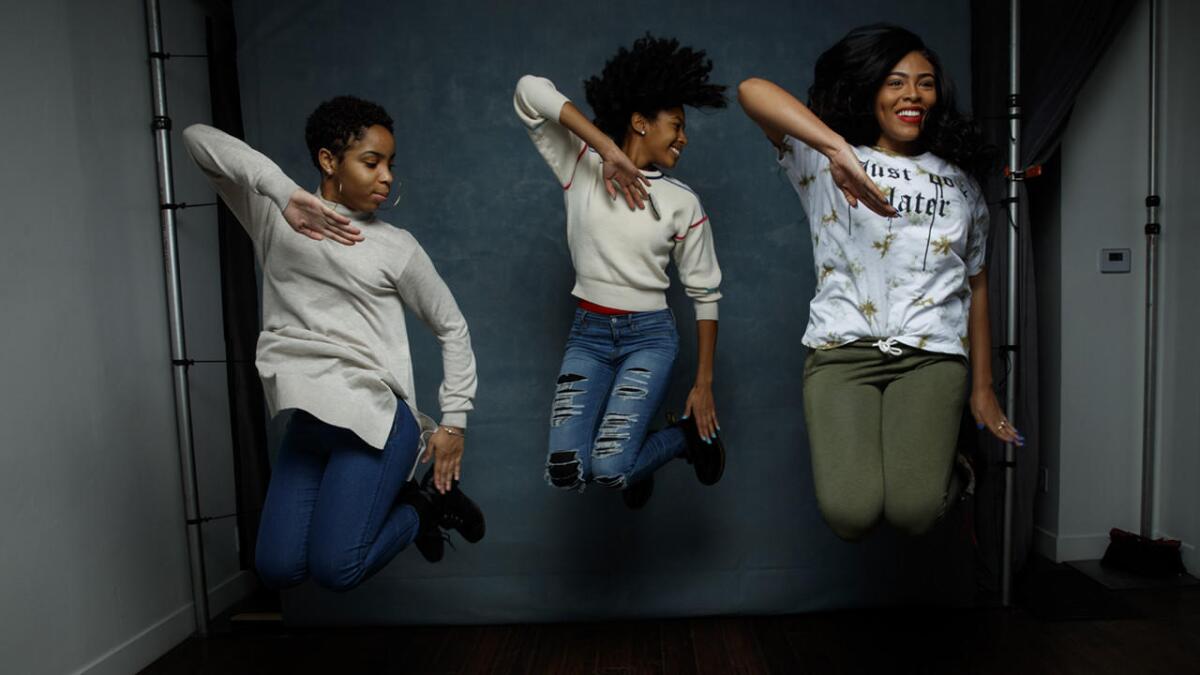


‘L.A. Times’ is a spiky portrait of romance in contemporary Los Angeles (and not the L.A. Times)
First things first. Yes, there is a movie at Sundance called “L.A. Times.” No, it does not have anything to do with this here media organization, the Los Angeles Times. (Trust me, when the festival’s program announcement came out, there were some very quizzical looks around the newsroom, as if people were afraid they had been in a documentary and/or reality show without knowing it.)
Rather, “L.A. Times” is a look, at once both breezy and insightful, into the personal and professional intersections of a small group of people in the creative enclaves of Silver Lake, Echo Park and Los Feliz. The first feature film directed by Michelle Morgan, who also wrote the screenplay and plays the lead role, “L.A. Times” launches her as a multifaceted talent to watch.
The film had its world premiere on Friday night at Sundance as part of the discovery-oriented Next section. In the film, Morgan plays Annette, who impulsively breaks up with her boyfriend, Elliott (Jorma Tacone), and finds herself feeling adrift. At the same time, Annette’s friend Baker (Dree Hemingway) has problems of her own as she juggles an affair with married man (Tate Donovan) and an increasingly complicated relationship with a cousin (indie stalwart Kentucker Audley, revealing himself as an unexpectedly credible romantic leading man). The supporting cast includes Margarita Levieva, Adam Shapiro, Angela Trimbur. Robert Schwartzman and Nora Zehetner.
Sundance filmmakers and local businesses steel for women’s march
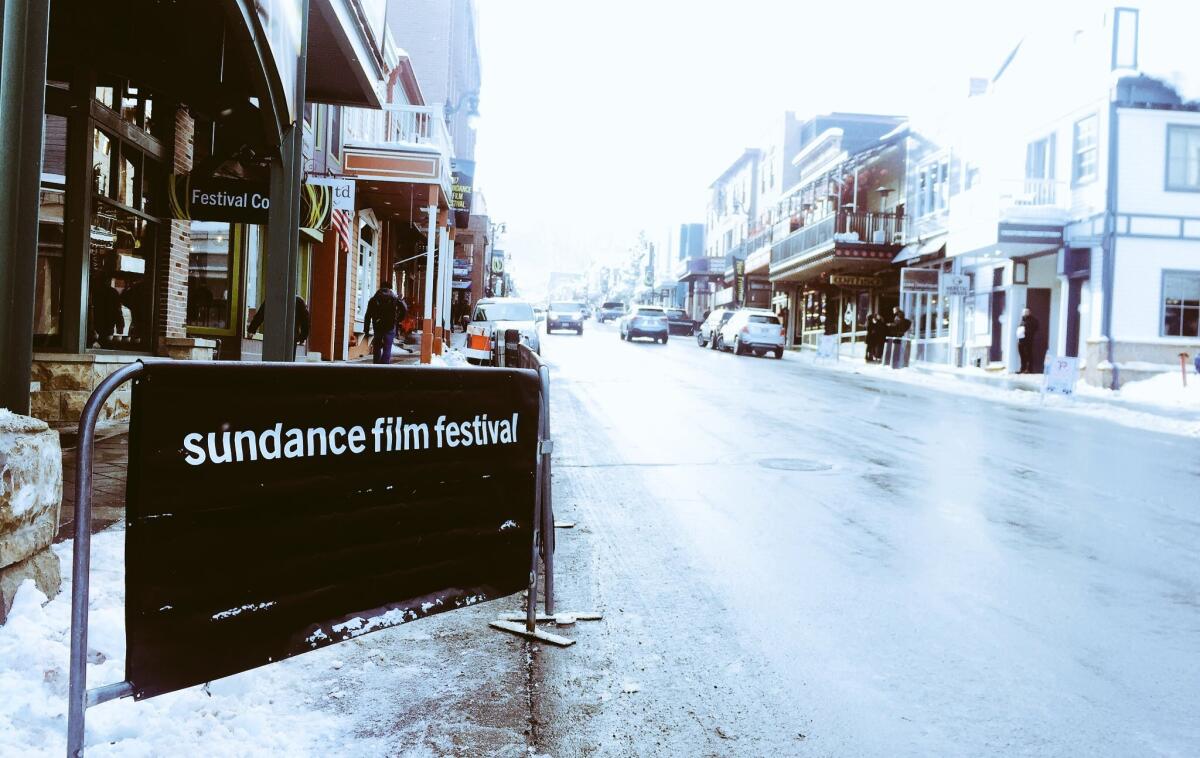
“Eight years ago was an amazing day,” said Emmy-winning film producer Julie Goldman (“Life, Animated,” “Weiner”) on a palpably subdued inauguration morning at the Sundance Film Festival. “Today is the opposite.”
Sundance veterans can vividly recall Inauguration Day 2009, when attendees of the prestigious annual film festival put the movies on pause, gathered in the snow-covered streets of Park City, Utah, and squeezed into viewing parties to watch Barack Obama get sworn in as the 44th president of the United States of America.
Friday morning at this year’s Sundance, no such celebration greeted the anointing of President Trump.
“There’s a cloud hanging over the festival in general. Everyone is down,” added Oscar-winning filmmaker Roger Ross Williams, who directed the Oscar-shortlisted documentary “Life, Animated,” about a family using movies to communicate with their autistic son.
‘Landline’ doesn’t connect, but ‘Novitiate’ is worthy of praise
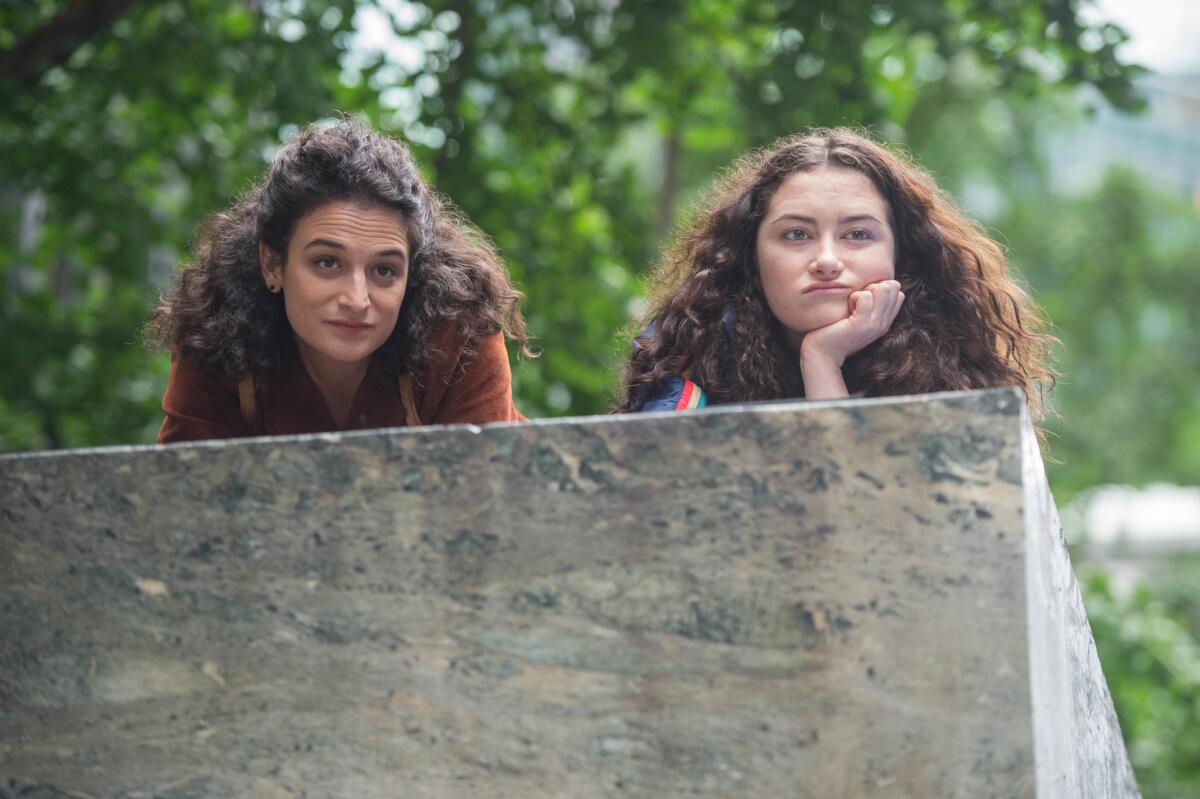
“The inauguration is over, so you can turn off your cellphones!”
That was the Sundance Film Festival’s director, John Cooper, introducing the Friday afternoon screening of Gillian Robespierre’s new comedy, “Landline.” For those of us who chose to bury ourselves in movies rather than pay attention to the events transpiring across the country, the mention of the inauguration jolted us briefly back to reality — a needle puncturing our cozy Hollywood bubble, if you will — shortly before the lights dimmed and a fresh distraction took over the screen.
Reactions to the inauguration seemed fairly muted in Park City, at least from this observer’s admittedly limited, partly scarf-concealed vantage. Rather than cheer, jeer or laugh in response to Cooper’s mention, most of us simply followed his instructions and put our cellphones away — a fitting enough way to ease oneself into a movie called “Landline.” In this 1995 nostalgia-fest, a Manhattan family must rely on floppy disks and mixtapes to make their way through a gauntlet of dysfunction and bad decision-making. (More political reminders: At one point, the characters watch Hillary Clinton delivering her “Women’s rights are human rights” speech in Beijing, though mostly they just admire her pink pantsuit.)
Chelsea Handler, Jessica Williams, Aisha Tyler and others take the stage at the women’s march at Sundance

Neither the snow nor the possible conflict with Robert Redford’s private brunch stopped Sundance filmmakers from participating in the women’s march at Park City, Utah.
Led by comedian Chelsea Handler, the independently organized event featured speeches by filmmakers, local politicians and activists, including Aisha Tyler, Jessica Williams, Dolores Huerta and Maria Bello.
“It’s not 1917; it’s 2017,” said Handler as she addressed the crowd gathered for the rally. “Who knew we had to fight for progress we already had?”
Tyler paid homage to previous activists in her remarks.
“If people felt despair during slavery, suffrage, Jim Crow and Stonewall, we wouldn’t have changes we have today,” she said.
Huerta, who was attending Sundance to attend the premiere of “Dolores,” a documentary about her life, was greeted by chants of “Si se puede” as she took the stage, while Bello gave a shout-out to Meryl Streep’s Golden Globes speech.
“I am Jessica Williams. I am black, and I am a woman. ... Williams is my slave name,” the actress said in her speech that recognized her ancestors who “fought for me to stand here today, in front of a bunch of white people wearing Uggs.”
See more images from the event below.
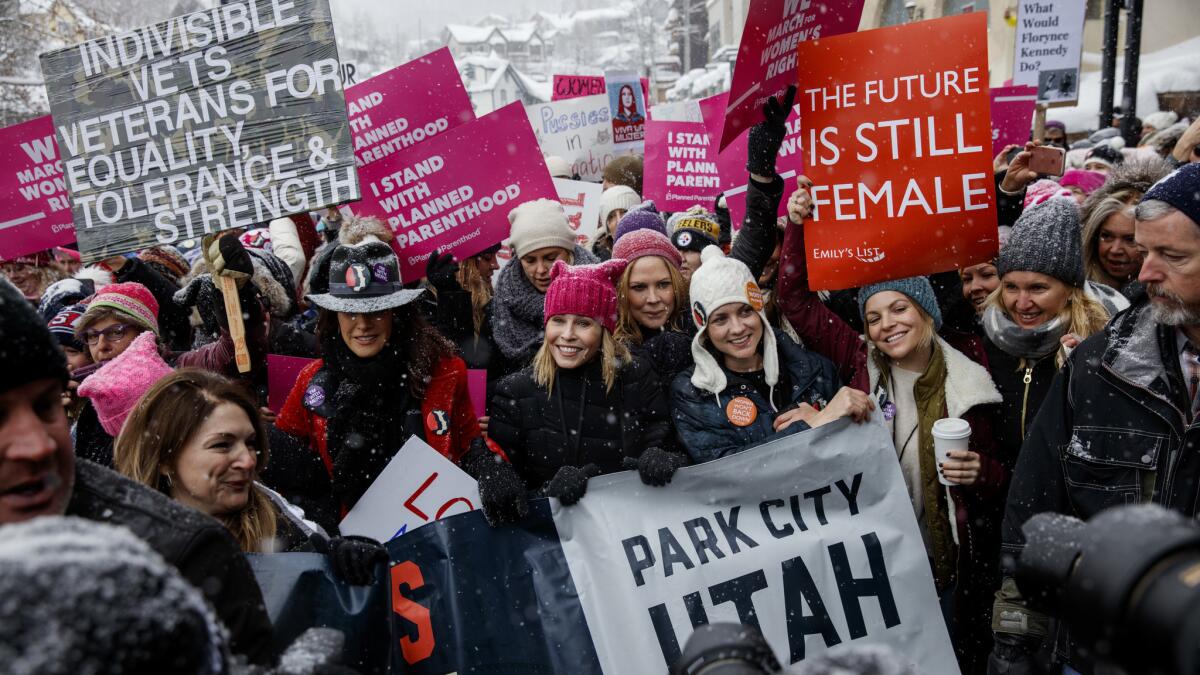
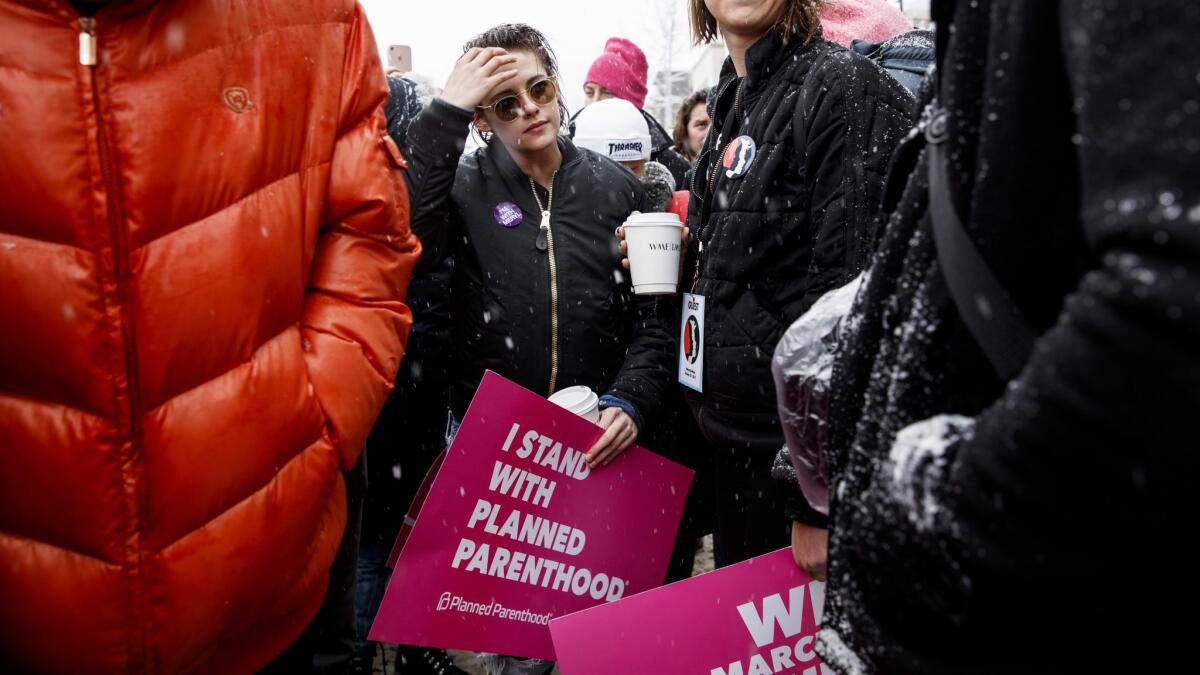
Watch the women’s march at Sundance
Chelsea Handler, Kristen Stewart, Charlize Theron and more were among the Sundance filmmakers spotted at an event dubbed the Women’s March on Main in Park City, Utah. Check out video from the march above.
Instant prints from the L.A. Times photo studio at Sundance 2017
‘Step’ routine rocks Times’ photo studio

The young women in “Step” demonstrate a routine at the L.A. Times photo studio during the Sundance Film Festival. The documentary is about senior girls in a Baltimore high school step team as they prepare to be the first in their families to attend
The young women in “Step” demonstrate a routine at the L.A. Times photo studio during the Sundance Film Festival. The documentary is about senior girls in a Baltimore high school step team as they prepare to be the first in their families to attend college.
Portraits from the L.A. Times photo studio at Sundance 2017
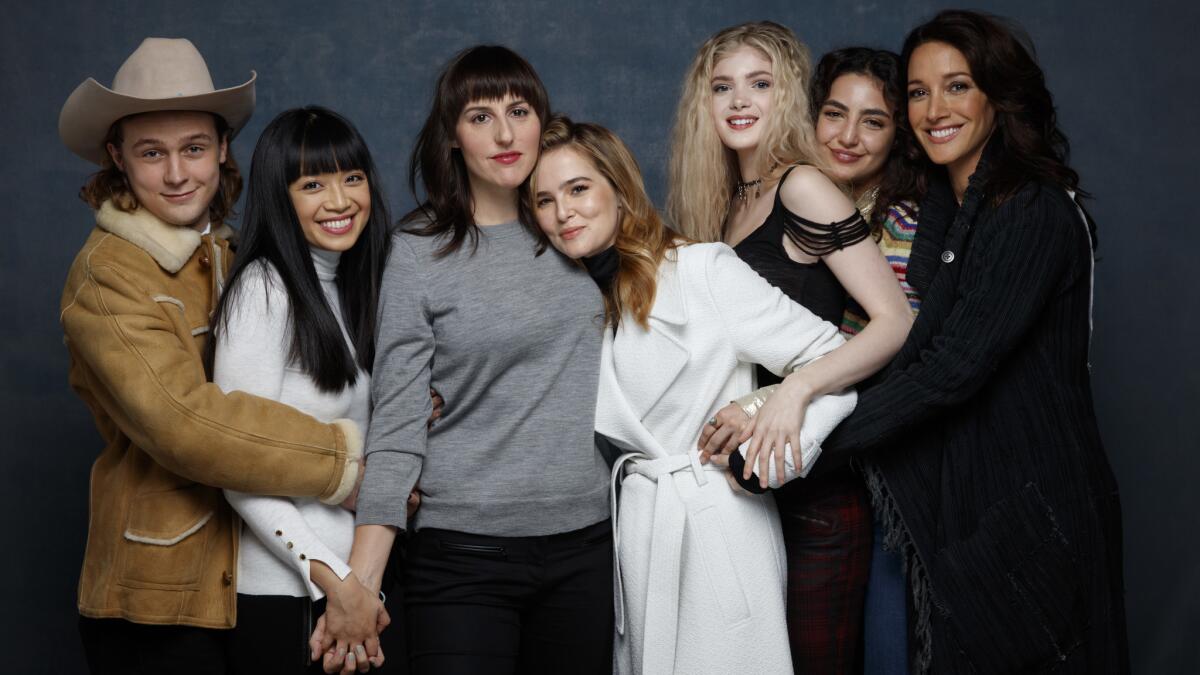
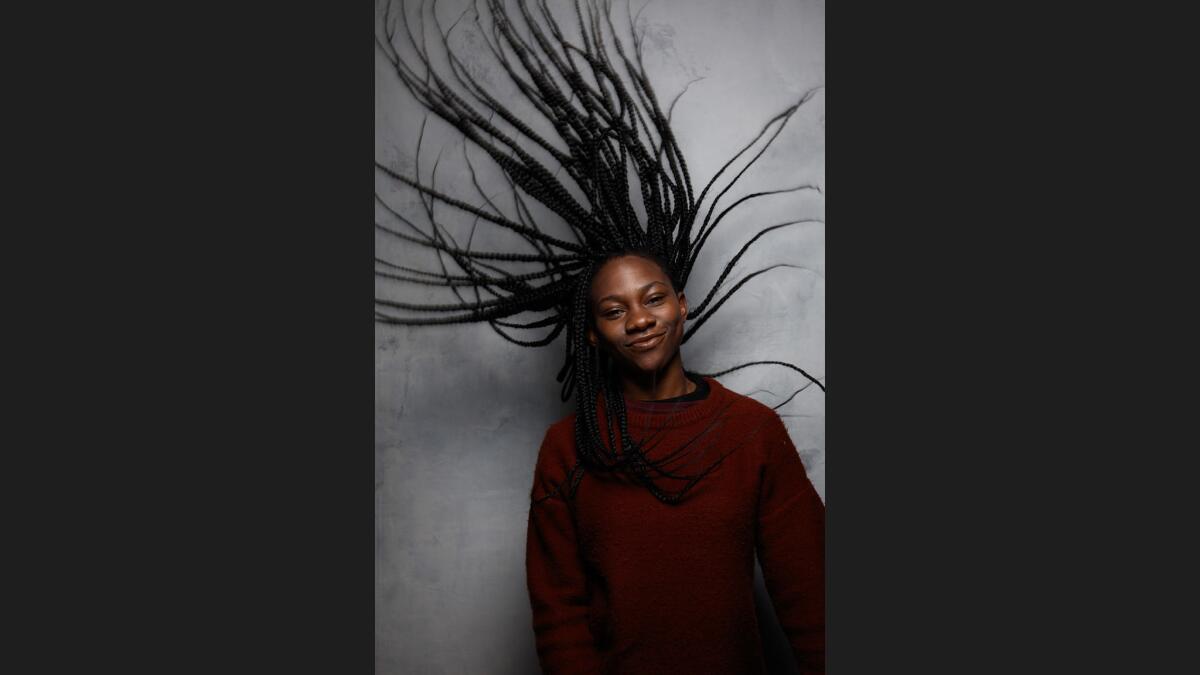

Documentary provocateurs say Trump presidency is also a time for reconciliation
Documentary filmmakers can be among the most politically provocative — and often Democrat-friendly — of all show business subsets.
But on a day when many in media and entertainment registered objections to new President Donald Trump on social media, nonfiction filmmakers took a more kumbaya stance at the Sundance Film Festival.
“After the election we all had to take a closer look at what we’re doing and the responsibility we have,” said filmmaker Jason Cohen, speaking with colleagues on a panel titled “A More Perfect Patriot” on Inauguration Day at the festival.
Cohen, whose Oscar-nominated short “Facing Fear” involves the meeting between a neo-Nazi and his victim 25 years after the attack, said that he was conflicted about the role of art at this crucible moment. “For me it was looking at these amazing films for years and say ‘look where it’s gotten us.’ On the other hand we need these films.” Then he added, “We need films that bridge a little bit and don’t just preach to the choir in this room.”
The panel, moderated by documentary programmer Thom Powers, covered a range of creative and topical issues. When he asked the group how the Trump election has affected their thinking and their work, they took an attitude that was less to-the-barricades and more to-the-olive branch.
Keith Maitland, who directed the gun-violence doc “Tower,” on this year’s Oscar shortlist, said that he was seeking the long view too. “In the last 48 hours, with all the talk about privatizing public broadcasting and abolishing the NEA, those are things I take personally as a filmmaker and as a citizen,” he said. “But as frustrated as some people are about the ascension of Trump, and as satisfied as some people are in the new direction, we’ve been here before and we’ll be here again.”
Kiran Deol, the actress and filmmaker known for the Oscar-nominated short “Woman Rebel,” said that after the election she was struck by the level of personal offense people took on both sides of the aisle. “How do you have control of a set of emotional circumstances because that isn’t the place you can do anything effective?” she said she asked herself. “How will you impact people once you stop yelling? I became acutely aware of how damaging anger can be … it redoubled my interest in finding a way to bridge the divide.”
Among the more political words came from director Jehane Noujaim, who chronicled the Egyptian revolution in the Oscar-nominated “The Square.” “Living with Trump and Brexit it really has you thinking,” she said when asked about the meaning of the word “patriot.” “That’s why I like this term global patriotism,” she said alluding to a new project on the subject. “It’s not just people from [here].”
But even when skeptical about Trump supporters, the panelists offered a conciliatory message. Razan Ghalayini, a doc director and field producer on “Full Frontal With Samantha Bee” described an encounter with a tea party activist who had had Trump sign his copy of the Constitution.
Though she was thrown by the gesture -- and alluded to her hope that Trump did not remain president for the full four-year term- - she said she found meaning in the gesture and the moment generally. “It forces everyone to find common ground,’ she said. “You can’t paint [political opponents] as the bad guy because you are them.”
Kristen Stewart on directing ‘Come Swim’: ‘I’m not trying to prove anything’

WATCH: Kristen Stewart talks about the free-form aspect of making her short film, “Come Swim,” which screened at the 2017 Sundance Film Festival.
Kristen Stewart enjoyed the free-form aspect of making her short film, “Come Swim,” which is showing at the Sundance Film Festival. She doesn’t see that as a directorial steppingstone to full-length features.
Dolores Huerta: ‘I think most of us in the progressive world feel very threatened right now’
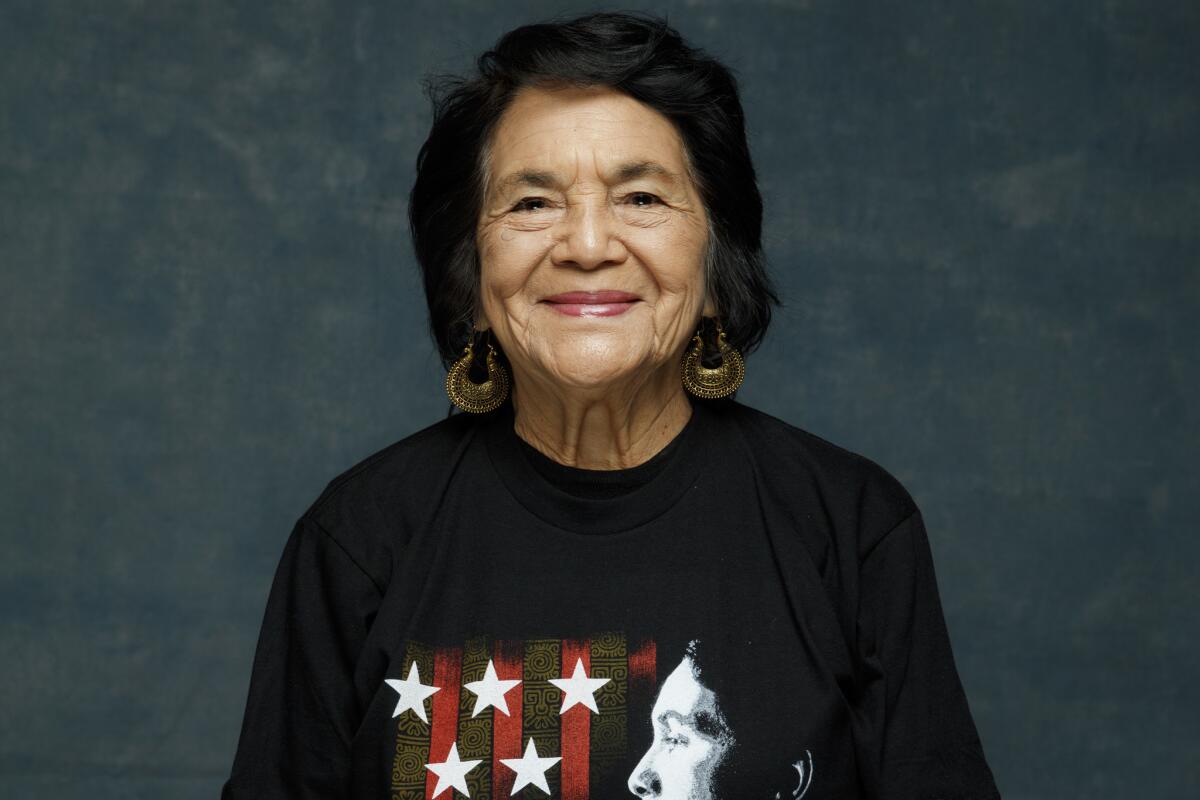
At 86, Dolores Huerta has been working as a civil rights activist for over six decades. But if you think she’s ready to put down her bullhorn and hit the links, you’ve got it all wrong.
“All this work that has to be done,” said Huerta, who co-founded what would go on to become the United Farm Workers, “as long as I have health and energy, I’m just gonna keep on doing it.”
Dressed in a Hillary Clinton-esque cherry red dress suit, the octogenarian was making her way through the snow Friday morning, hours before a documentary about her life — simply titled “Dolores” — was set to premiere. On Saturday, Huerta will speak at the local Women’s March being led by Chelsea Handler, though she said she has yet to plan her remarks.
“I usually am very spontaneous,” she said, adding that she was initially slated to speak at the march in D.C. before “Dolores” was accepted into the festival. “I try not to repeat what other speakers are saying so I don’t get redundant. I want to feel what the appropriate message will be at that moment.”
Participating in the March is particularly important to the Bakersfield resident, who feels “organizing at the grassroots level is the key to everything, basically.” If the new administration makes good on its plans to defund Planned Parenthood and the Affordable Care Act, there will be even more reason to protest, she said.
“I think most of us in the progressive world feel very threatened right now,” said Huerta, who opted not to watch the inauguration. “And I think all of us are hoping that somehow we will be able to reach [Donald Trump’s] heart. Once he’s in that position, maybe he will start getting some consciousness and some compassion. I hope he sees all of these protests across the country as a message and not just a criticism.”
Tools of the trade at the L.A. Times photo studio at Sundance 2017
‘An Inconvenient Sequel’ marks a welcome return to the spotlight for Al Gore
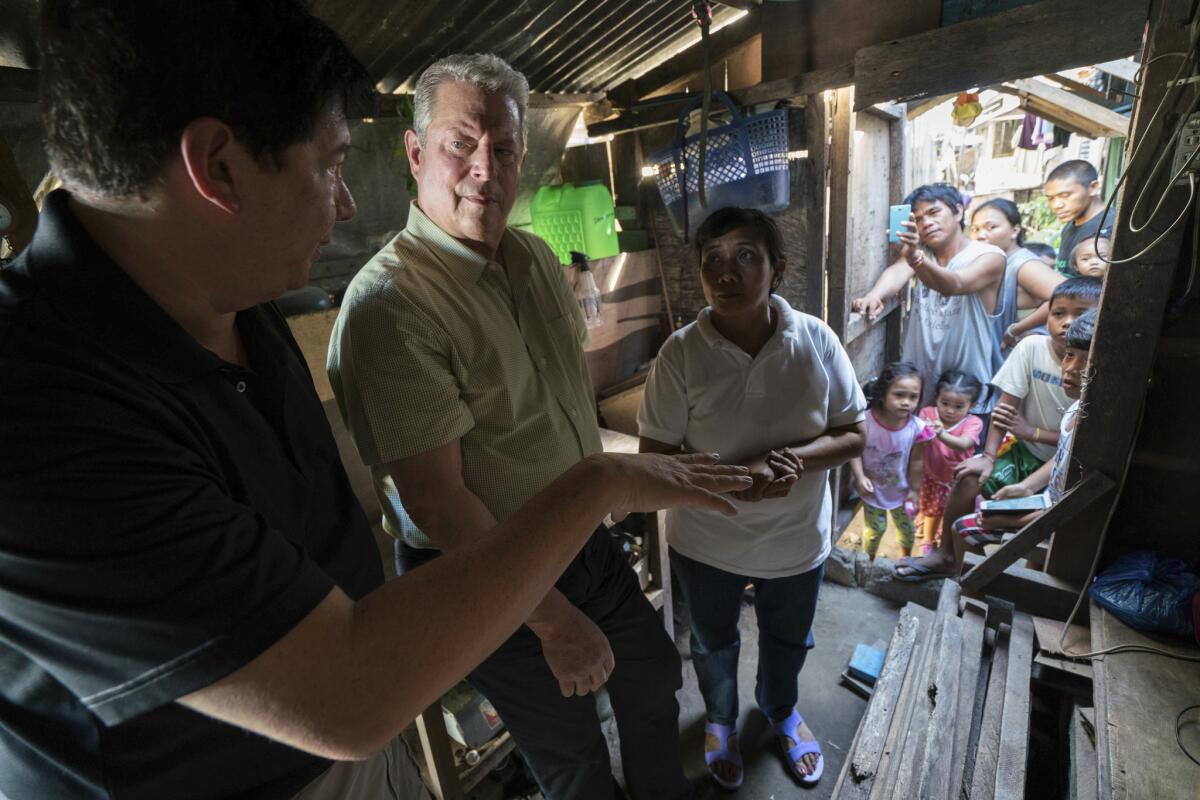
Amid all its grim revelations of melting ice caps and depleted permafrost, the Oscar-winning documentary “An Inconvenient Truth” provided at least one genuinely thrilling revelation: Al Gore was a movie star.
Long derided for his stiffness and lack of charisma as a politician, the former vice president and failed presidential candidate had discovered his true calling as an evangelist for planet Earth, with a PowerPoint pulpit and a sermon full of depressing statistics. In “An Inconvenient Truth,” which first screened at the 2006 Sundance Film Festival, Gore took to his crusader role with the ease and conviction of someone who had nothing to lose, in part because he knew how much we all did.
Eleven Sundances later, Gore’s star wattage seemed entirely undimmed at Thursday evening’s premiere of “An Inconvenient Sequel: Truth to Power,” an awkwardly titled, stirringly crafted follow-up that measures the progress that has and hasn’t been made in the battle against global warming. Taking over for Davis Guggenheim, the directors Bonni Cohen and Jon Shenk largely abandon the framing device of Gore’s lecture (which he and his international team of trainees continue to give regularly) in favor of a nimbler, more on-the-go approach.
Despite some updates on the continuing decline of the world’s glaciers and the link between climate change and the recent Zika virus outbreak, the focus this time is less on science than on politicking. Cohen and Shenk tag along with Gore on a globetrotting mission to persuade various heads of state to invest in wind and solar energy and reduce their reliance on fossil fuels — an effort that culminates on-screen with the signing of last year’s historic Paris climate accord.
Environmental documentaries have, of course, become a veritable cottage industry in the years since “An Inconvenient Truth.” This year’s edition of Sundance alone will unspool several in a new section called the New Climate, including Marina Zenovich’s “Water & Power: A California Heist” and Jiu-liang Wang’s “Plastic China.” Next to all the competition, it’s Gore’s personality — something that he was once mocked for not possessing — and his personal history that give this ongoing cinematic project its particular gravitas. At 68, he may be grayer and paunchier, but the image he projects of an assured, steely intellect wrapped in that warm Tennessee drawl seems all the more indelible and authoritative.
More vital dispatch than great cinema, “An Inconvenient Sequel” made undeniably strong counterprogramming on the eve of Donald Trump’s presidential inauguration, not least because of its poignant reminder that Hillary Clinton was not the first Democratic presidential candidate to win the popular vote but lose the election. While the film duly honors the role that President Obama and Secretary of State John F. Kerry played in negotiating the Paris accords, Trump is treated as a mocking presence on the sidelines, dismissing the importance of climate change — and then suddenly, alarmingly ascending to power in the movie’s climactic stretch.
“We will win,” Gore told the crowd during the post-screening Q&A, to thunderous applause. I admit, after 99 minutes of explanations of freak weather patterns and the hottest year on record that was 2016, it was a relief to step out into the chilly Utah air and be comforted, if only for a moment, that the man might be right — and that we might yet live to see still another “Inconvenient” sequel.
Judd Apatow: ‘I have zero optimism’ about Trump presidency
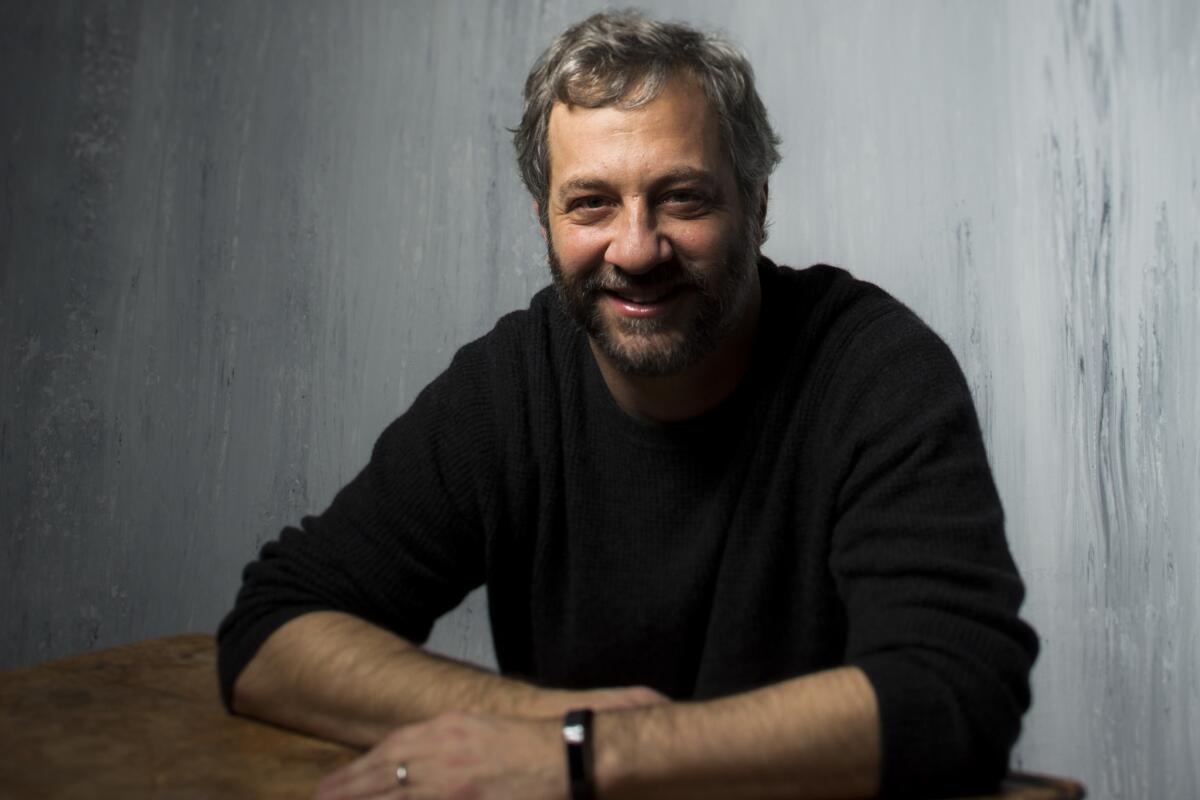
If you follow filmmaker Judd Apatow on Twitter, you know he’s no fan of our new president.
After a restless night, Apatow made the rounds here Friday morning just as the inauguration got underway, helping to promote a new movie he produced called “The Big Sick.”
“I’m happy I have a full schedule,” he said, noting the timely nature of his new comedy, which explores the cultural differences between a Pakistani-born Muslim and his girlfriend, an American graduate student.
Not that Apatow was likely to tune into the D.C. proceedings, anyway.
“I have zero optimism,” he said of the new administration. “I don’t trust these people, and I think that we all have to be on top of it every step of the way or bad things are going to happen.”
Moving forward, Apatow said he plans on putting his energy into helping the American Civil Liberties Union and other organizations that combat voter suppression.
“Most people don’t realize that this happened because people didn’t vote,” the filmmaker said. “If people register and get organized, a lot of this goes away at the midterms. But people should start working on that now.”
Al Gore on Donald Trump: ‘No one person can stop’ climate change movement
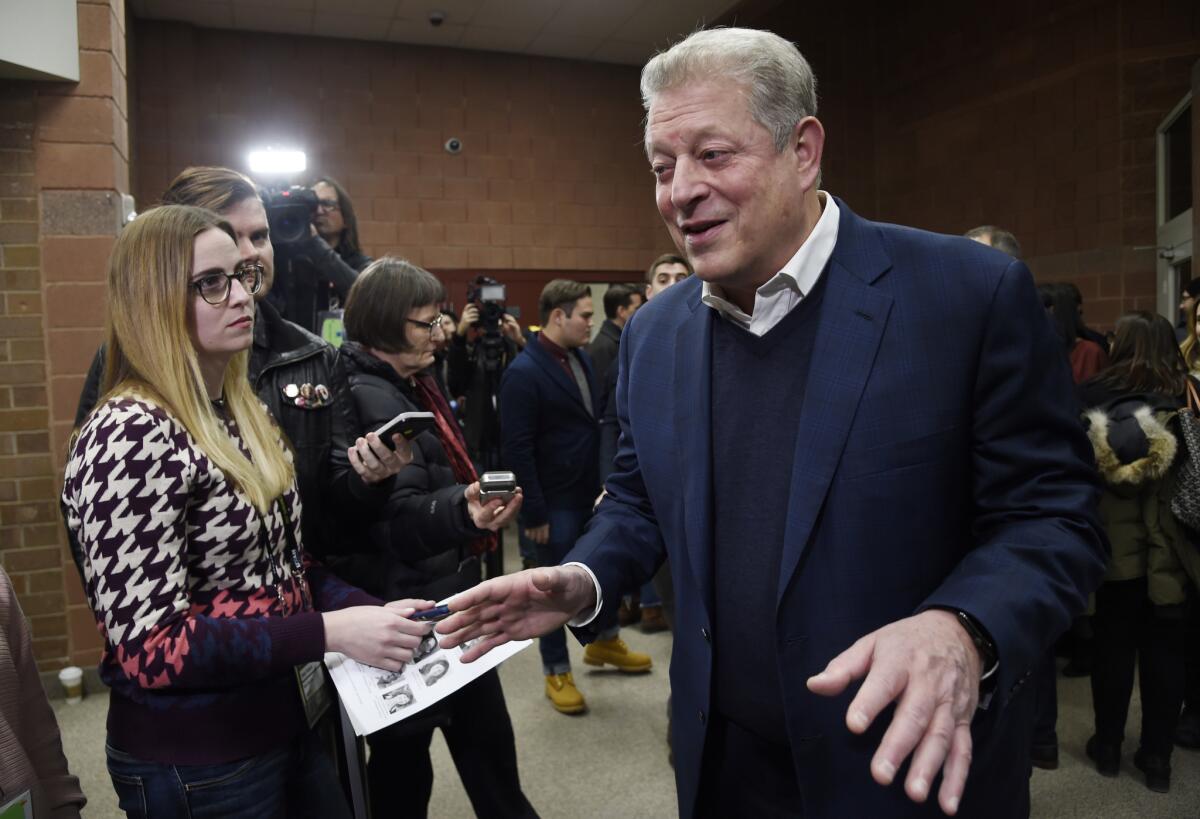
On the eve of Donald Trump’s presidential inauguration, Al Gore told a crowd at the Sundance Film Festival that he remained optimistic about making progress on climate change -- even if Trump didn’t believe in global warming.
Former Vice President Gore spoke to more than 2,000 filmgoers here Thursday evening, where a sequel to his 2006 documentary “An Inconvenient Truth” kicked off this year’s annual festival. The film, co-directed by husband-and-wife Jon Shenk and Bonni Cohen, is part of “The New Climate,” a Sundance program launched this year devoted to stories about the challenges facing our planet.
After the screening, which was attended by environmentally minded filmmakers Louie Psihoyos (“The Cove”) and Jeff Orlowski (“Chasing Ice”), Gore was asked during an audience Q&A about his recent meeting with Trump and daughter Ivanka.
Though he declined to reveal details about the December conversation in case he “needs to have more” meetings with the incoming president, Gore pointed out that many climate change deniers have eventually gone on to switch their positions. “Whether he will or not,” Gore said, “remains to be seen.”
He did, however, express mild disappointment in Trump’s recent appointment of Scott Pruitt as head of the Environmental Protection Agency. Pruitt, the attorney general of Oklahoma, has expressed doubt about the extent of global warming and its connection to the actions of mankind. Trump once called climate change a hoax, though he’s recently softened that stance, saying there may be “some connectivity” between humans and the Earth’s temperature.
“I don’t think [Pruitt] should head the EPA,” Gore said. “But the story has many chapters to unfold here.... No one person can stop this.”
“An Inconvenient Sequel,” which is being released by Paramount Pictures on July 28, tries to maintain an upbeat tone despite showing the harsh realities of melting glaciers and rising waters in big cities like Miami. Arguably its most riveting section occurs at the United Nations Framework Convention on Climate Change, which took place in Paris in 2015 just weeks after a slew of terrorist attacks ravaged the city.
The film shows how pivotal Gore’s role was in convincing India -- which wanted to stick with fossil fuels instead of renewable energy -- to sign the Paris agreement. In one scene, Gore calls Lyndon Rive, the co-founder and CEO of SolarCity, to request the company pitch in on helping India install transition to solar energy.
“There was a moment when politics and the Supreme Court was not very kind to Al,” Sundance founder Robert Redford said at the screening. “And that drove him toward film.”
Indeed, even though he is constantly asked by journalists in the film if he’ll return to politics, it’s clear Gore’s life work is protecting the Earth. “If there were times I said this didn’t feel like a personal failure, I’d be lying,” he says in the movie of his efforts to get the public interested in climate change.
“We are going to prevail,” he told the crowd before leaving the stage. “And if anybody has doubts about our will to act, just remember: The will to act is itself a renewable resource.”
Jessica Williams gets ready to meet ‘The Incredible Jessica James’
This is really important to me. I just got my braids redone and my edges laid for this screening. If you’re white and you don’t understand what I said, find the nearest cocoa person and ask them to elaborate. This is Sundance, you guys should open up your minds.
— Jessica Williams, introducing a screening of “The Incredible Jessica James”
The L.A. Times studio kicks off at Sundance
Can Al Gore’s ‘Inconvenient Sequel’ reverse the trend that’s made climate change docs a hard sell?
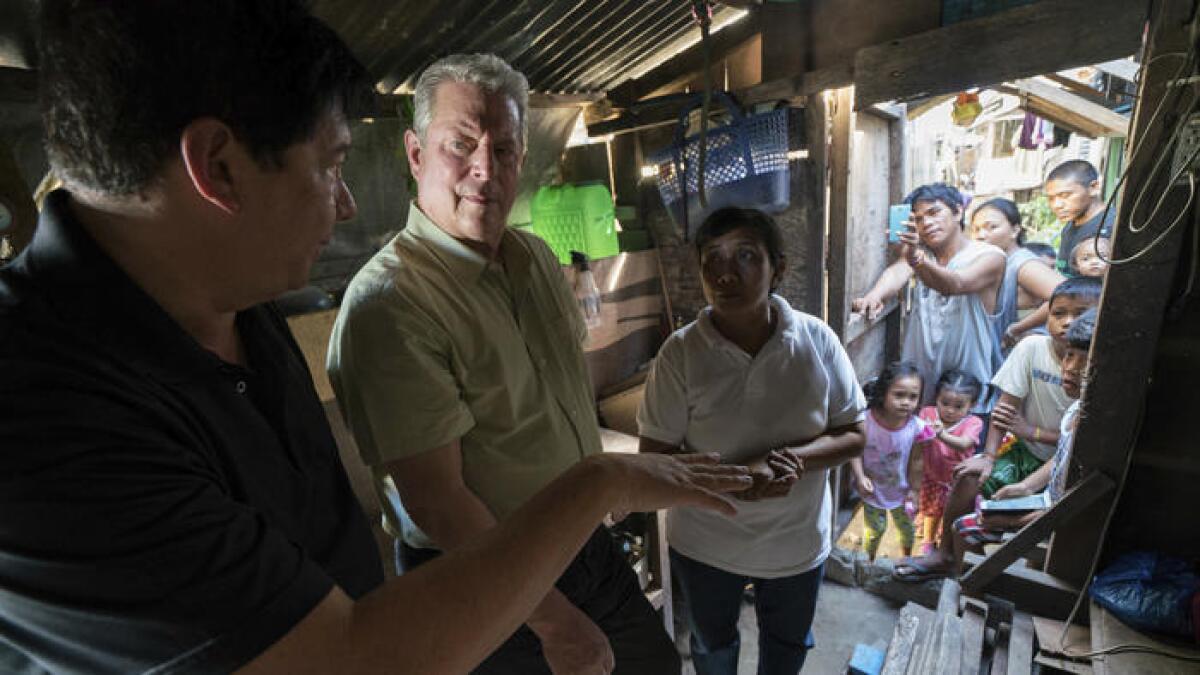
Last summer, organizers of the Sundance Film Festival, meeting in Los Angeles, were stumped. Where had all the movies about the destruction of the planet gone?
“After a flurry of documentaries like ‘The Cove’ and ‘Blackfish,’ we’d seen a decline in films about the climate over the last few years,” recalled John Cooper, the festival’s director. “Maybe nobody cared anymore. Climate change seemed to have slipped out of the public awareness a little bit, and it wasn’t helped at all during the election process, because nobody was talking about it much then, either.”
Even this week’s news that 2016 was the hottest year since 1880 — the third record-breaking year in a row — didn’t get much traction. In this moment when the incoming president of the United States has questioned whether climate change is real, documentaries about the environment are a hard sell at movie theaters. They often urge filmgoers to make real-life changes: Stop eating so much steak, invest in solar panels, drive electric cars. . . .
More and more films dealing with the environment have come to us. They’ve created their own category.
— Robert Redford, on Sundance’s New Climate series
Despite the seeming drop in interest, Sundance organizers — including founder Robert Redford, himself an outspoken environmentalist — are convinced there’s an audience for these documentaries and decided to devote an entire program to “environmental change and conservation” at this year’s festival.
Most prominent in the festival’s New Climate series is Thursday evening’s premiere of “An Inconvenient Sequel,” the follow-up to the original Gore documentary that debuted at Sundance 11 years ago.
Sundance documentary ‘Icarus,’ about Russian doping, could light another match under U.S.-Russia relations
When he went public with doping allegations last May, Russian whistle-blower Grigory Rodchenkov told a remarkable story.
A long-serving chief of the country’s anti-doping program, Rodchenkov confessed that, out of the same lab designed to nab cheaters, he’d also secretly been running a state-sponsored doping program. During the 2014 Winter Games in Sochi, Rodchenkov said that at the behest of Vladimir Putin’s government he had used that watchdog lab to provide dozens of athletes with banned substances — then supervised an elaborate operation to swipe out their urine samples. Many went on to win medals.
The account triggered a massive investigation by the World Anti-Doping Agency and has caused a furor in the international community (and a Russian PR counter-strike).
But Rodchenkov’s allegations would likely have never come to light if not for the unexpected involvement of Bryan Fogel, a first-time documentary filmmaker with no previous connection to doping or the Olympics.
History and comedy collide with Aubrey Plaza, Alison Brie and Dave Franco in Sundance premiere ‘The Little Hours’
A title card announces the year as 1347 as a young woman in a nun’s habit leads a donkey across an idyllic countryside. She passes through one verdant glen after another on her way back to a small convent, and when she and her sister nuns eventually speak, it is in a pitched contemporary upspeak. Contemporary to now, not then.
Writer-director Jeff Baena’s “The Little Hours” is making its world premiere Thursday as part of the Midnight section at the 2017 Sundance Film Festival. Adapted from stories drawn from Giovanni Boccaccio’s medieval book “The Decameron,” the film draws humor from the tension between its setting and the way the characters speak and interact as a story unfolds about a fugitive servant (Dave Franco) who pretends to be a deaf-mute to be taken in by a convent that includes three young nuns (Aubrey Plaza, Alison Brie, Kate Micucci), each dealing with personal crises of their own.
The film has quite a cast, as it also includes John C. Reilly, Molly Shannon, Nick Offerman, Adam Pally, Fred Armisen, Paul Reiser, Lauren Weedman, Jemima Kirk and Paul Weitz.
Why are Sundance alums Nate Parker and Casey Affleck treated differently when it comes to sexual-misconduct allegations?
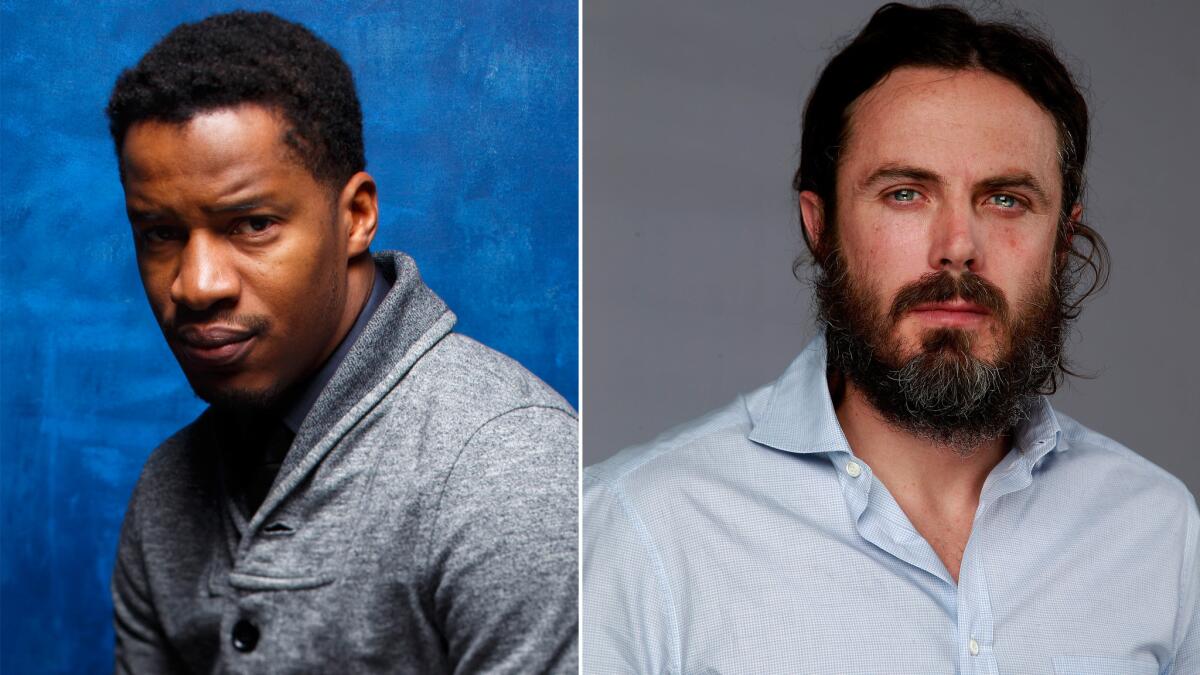
On the night of the Golden Globes — as he had for many of the awards season trophy ceremonies — actor Casey Affleck bounded onto the stage to accept his award as best lead actor in a drama for his turn in “Manchester by the Sea.” Meanwhile, Nate Parker, the multi-hyphenate lead of the Nat Turner slave revolt flick, “The Birth of a Nation,” wasn’t anywhere to be seen on the show that, 12 months prior, he was considered all but a lock to be a fixture of.
The 2017 awards season was supposed to belong to Parker and Affleck, as both of their films had stormed out of Sundance a year ago this week to positive reception with glory in their sights.
But the experiences of these two men have been vastly different. In the time since “Manchester’s” and “Birth’s” Sundance premieres, past cases involving both actors and allegations with sexual impropriety came to light.
Sundance is a place to sell things, and fortunately that includes good films

On the schedule are no fewer than six dramas set in Brooklyn, three documentaries involving Syria, an entire section devoted to climate change, even a documentary modestly titled “Trumped: Inside the Greatest Political Upset of All Time.”
Let it not be said that the Sundance Film Festival neglects the trending hot spots of today’s world.
But you already knew that. That’s why you’re either headed for the event beginning Thursday night in Park City, Utah, or at least planning to read all about it. Because where the independent film world is concerned, whether we’re talking “Brooklyn” or “Reservoir Dogs,” Sundance is the place where the future happens first.
That renown translates into economic as well as aesthetic success, with Sundance reporting that last year’s festival attracted 46,600 visitors and “generated $143.3 million in economic activity for the state of Utah.” Which is not half bad.
All that prosperity means that Sundance has become a bit like Rick’s Cafe in “Casablanca,” the place where everyone with anything to sell or promote shows up. The festival has a full 23 high-profile official sponsors this year, from Acura to Adobe to American Airlines, not to mention unofficial commercial presences from Kia to Kickstarter.
Follow the L.A. Times reporters on the ground at Sundance
The L.A. Times is on the ground at Sundance. Follow along on Twitter here.
With ‘Menashe,’ director Joshua Weinstein seeks to get behind the veil of New York’s Hasidim
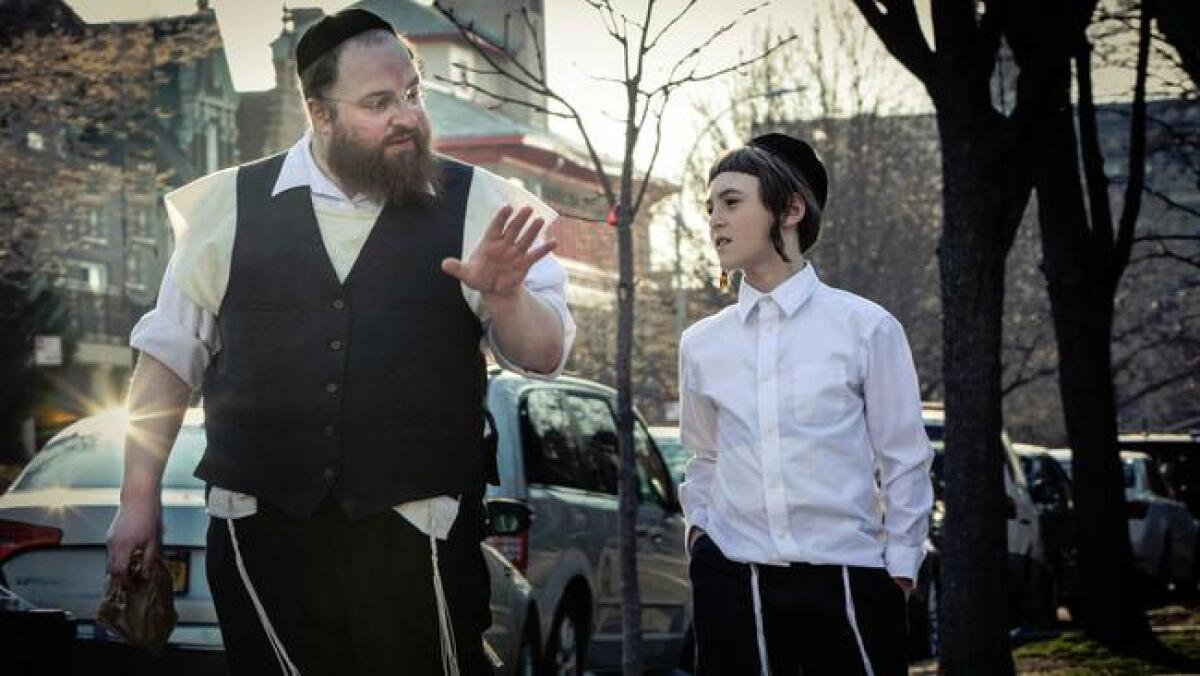
The secular filmmaker Joshua Weinstein stood on a helter-skelter corner in this ultra-Orthodox Jewish neighborhood next to shops selling conservative fashions and Internet-disabled smartphones, and pondered his recent guerrilla shoot.
“The strangest casting moment, let me think about that,” the director said, tilting back his head. “It might be all the times I sat through an hour of evening prayers because I happened to be talking to a potential actor and they needed a 10th man for a minyan [a prayer quorum]. Or maybe it was when I accompanied the rabbi to the mikveh [Jewish ritual bath].”
He paused thoughtfully. “It’s hard enough to cast your independent film when you’re not submerged without clothes in steamy waters.”
Weinstein experienced a series of colorful moments to craft the low-key authenticity of “Menashe,” his heartfelt gem of a scripted drama that will premiere Monday at the Sundance Film Festival in the upstart Next section. At a time when television series such as “Breaking Amish” aim to shed light on cloistered religious communities, “Menashe” harbors similar goals in a fresh context: It seeks to get behind the veil of New York’s Hasidim, people generally depicted in pop culture as enigmatic props, when they’re even seen at all.
Will this be the year a film that premiered at Sundance takes home the Oscar?
No movie that has premiered at the Sundance Film Festival has ever gone on to win the Oscar for best picture.
Could this be the year? “Manchester by the Sea” is considered a strong contender for a nomination.
The Park City, Utah, festival has boasted its share of Oscar winners over the decades — Cher (“Moonstruck,” not a premiere, but it did play shortly after opening), Kevin Spacey (“The Usual Suspects”) and Mo’Nique (“Precious”) are among the actors who have parlayed Sundance success into Academy acclaim.
The best picture prize remains elusive, though. Possibly, it’s too challenging to maintain interest and buzz between a January debut and a ceremony that hands out its awards 13 months later.
First look at ‘Golden Exits’ with Jason Schwartzman, Chloë Sevigny and Beastie Boys’ Adam Horovitz
Writer-director Alex Ross Perry steps into the spotlight of the festival’s U.S. Dramatic Competition for the first time this year with “Golden Exits,” with a cast that includes Jason Schwartzman, Chloë Sevigny, Mary-Louise Parker, Analeigh Tipton and Lily Rabe. Beastie Boys member Adam Horovitz also stars, continuing his recent return to movie acting after his appearance in Noah Baumbach’s “While We’re Young.”
FIRST LOOK: A series of stills from “Golden Exits,” with extended captions written by Perry.
Returning filmmakers make waves in Sundance’s Premieres, Documentary Premieres and Midnight sections
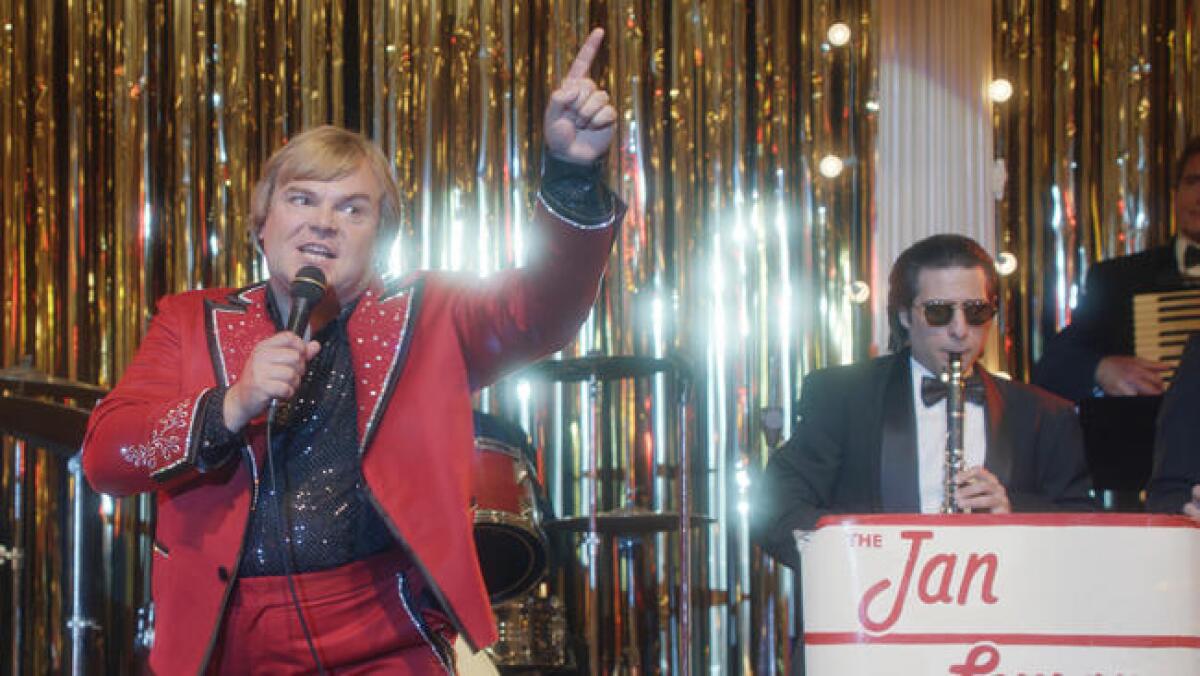
The Sundance Film Festival brought the continued rollout of its 2017 program into sharper focus Monday with the announcement of multiple sections, including Premieres, Documentary Premieres, Midnight, Spotlight and Special Events.
Many of the most anticipated titles in the festival come from the Premieres section, which also generates some of the highest-profile distribution sales. Titles from last year’s Premieres selection included “Manchester By the Sea,” “Certain Women,” “Hunt for the Wilderpeople,” “Indignation,” “Little Men,” “Love & Friendship” and “Sing Street.”
This year the section includes many returning Sundance filmmakers, including Miguel Arteta and Mike White with “Beatriz At Dinner,” Ry Russo-Young with “Before I Fall,” Michael Showalter with “The Big Sick,” Luca Guadagnino with “Call Me by Your Name,” Charlie McDowell with “The Discovery,” Jim Strouse with “The Incredible Jessica James,” Mark Pellington with “The Last Word,” Michael Almereyda with “Marjorie Prime,” Dee Rees with “Mudbound,” Maya Forbes with “The Polka King” and Craig Johnson with “Wilson.”
Also in the section will be Alethea Jones’ “Fun Mom Dinner,” Julian Rosefeldt’s “Manifesto,” Danny Strong’s “Rebel In the Rye,” Mark Palansky’s “Rememory,” Shawn Christensen’s “Sidney Hall,” Andrew Dosunmu’s “Where is Kyra?” and Taylor Sheridan’s “Wind River.”
Sundance may take on a more political feel as Trump’s inauguration and films’ subject matter affect the festival
The Sundance Film Festival has long been a bastion of values of inclusion and diversity that have suddenly become deeply politicized following the recent election cycle. What often seemed essentially harmless, platitudinous stances may suddenly take on an oppositional, even radical, dimension.
The festival has begun to roll out the programming announcements for its 2017 edition with the release Wednesday of an initial slate of 66 films for the U.S. Competition, World Competition and Next sections.
This year’s festival, which takes place Jan. 19-29, overlaps with two events from beyond its home state of Utah that may nevertheless have an impact on it — the presidential inauguration and the announcement of this year’s Oscar nominations.
The festival’s programming team was already deep in the throes of pulling together the festival long before the recent presidential election results, but they expect the mood of the festival may now be different than what they were initially anticipating.
